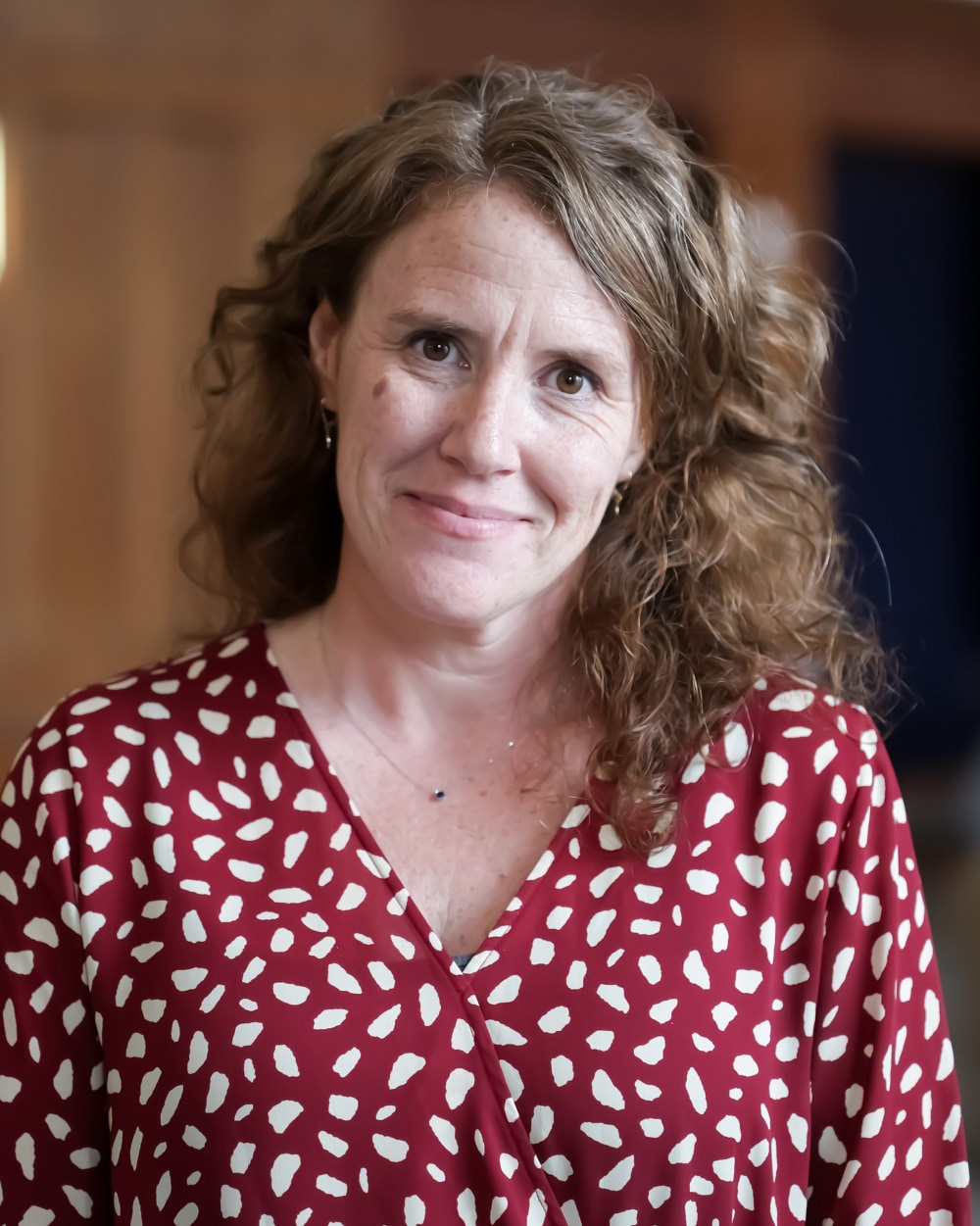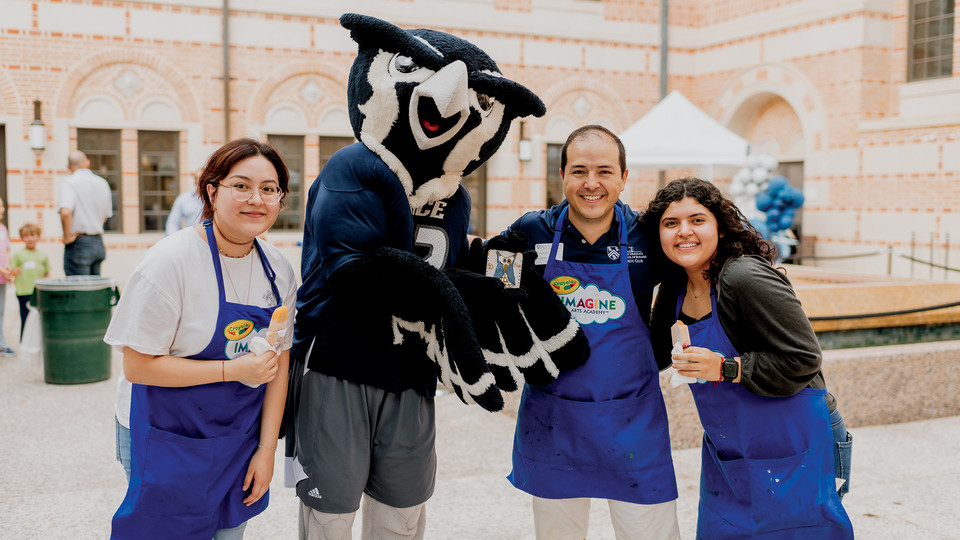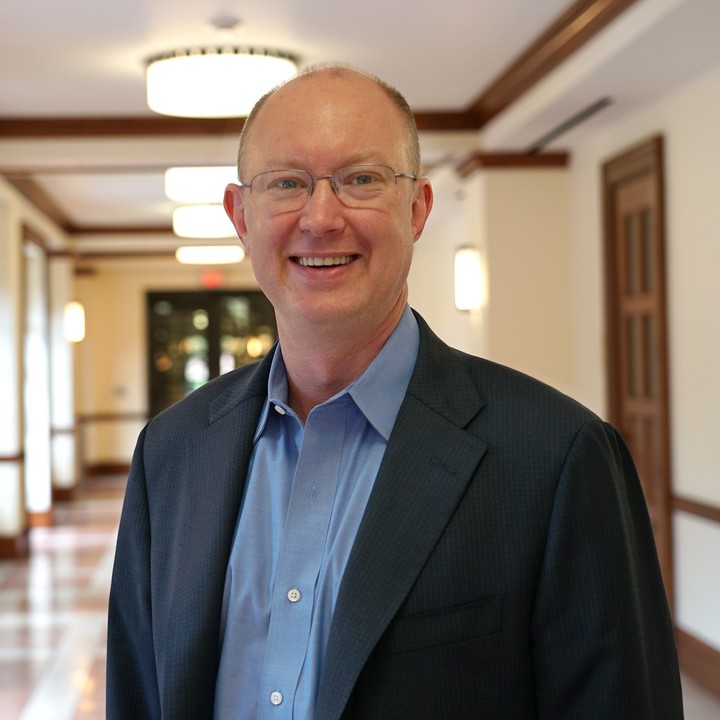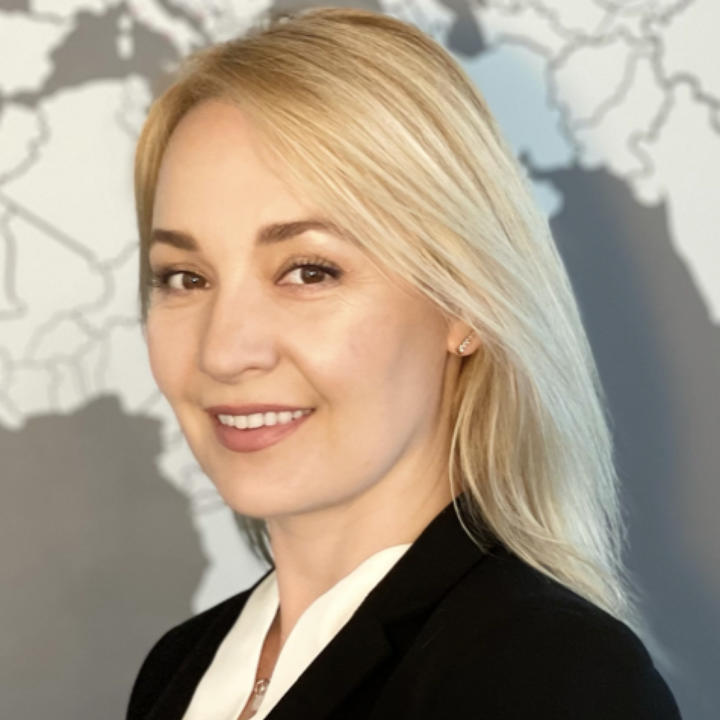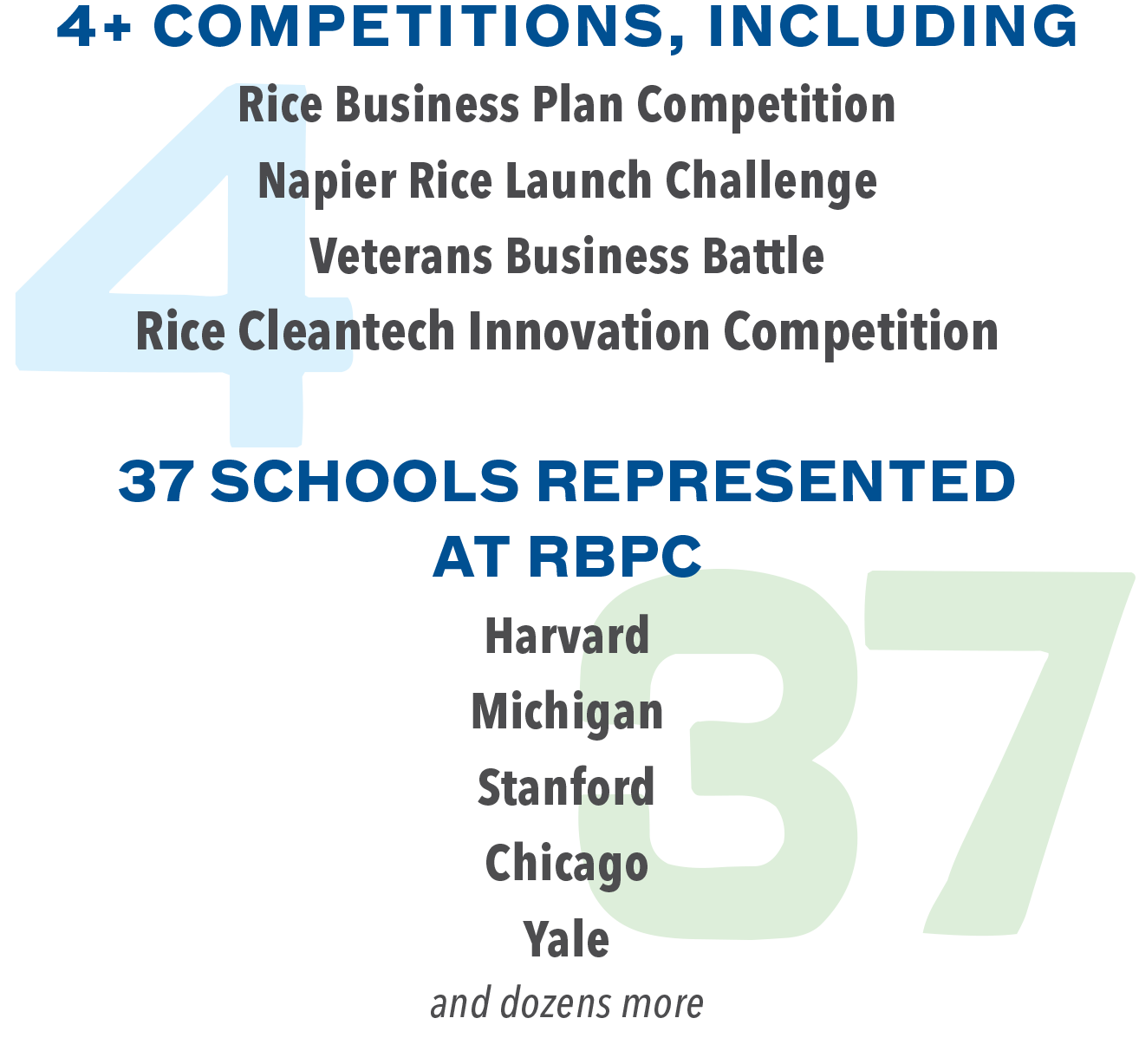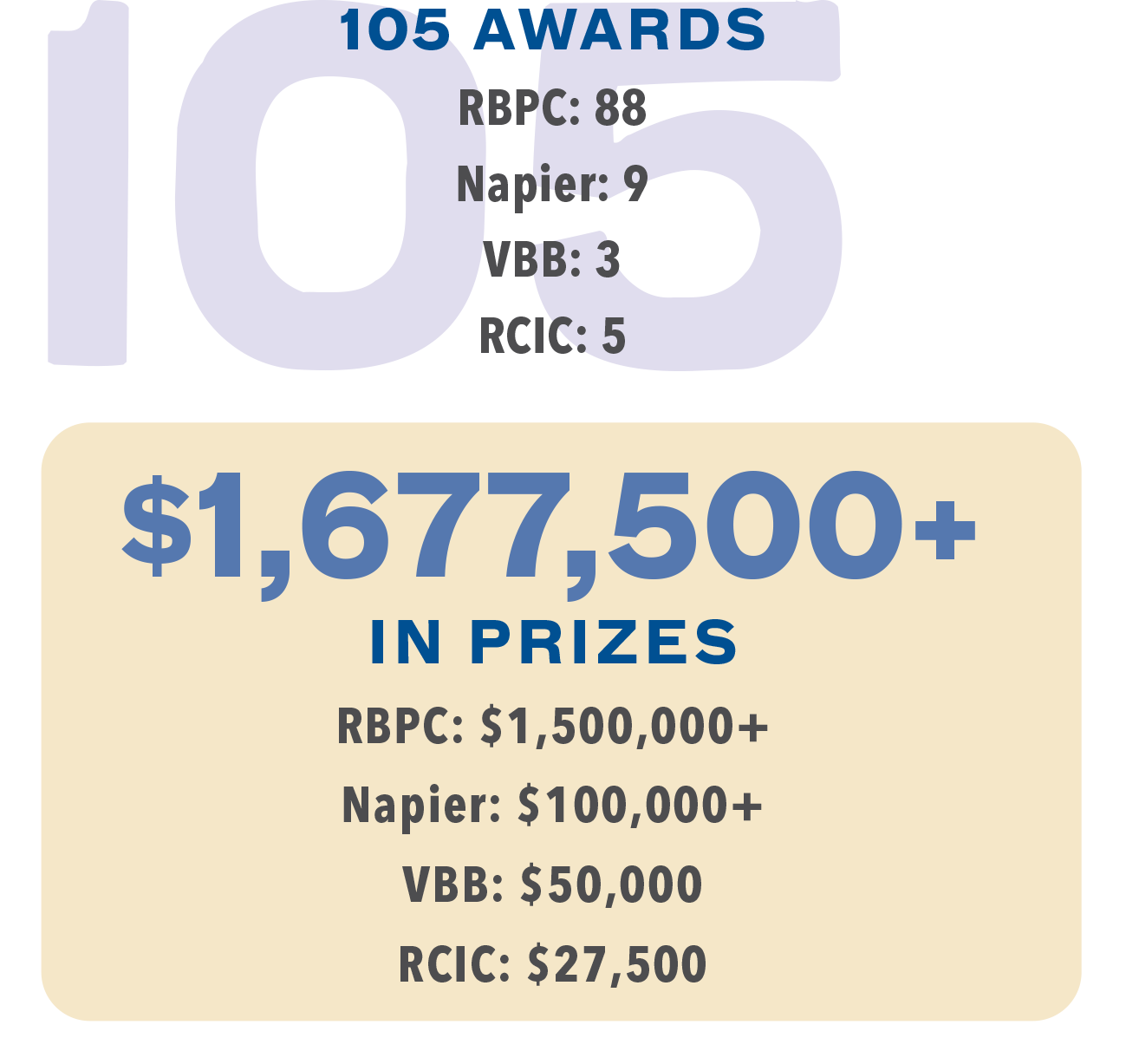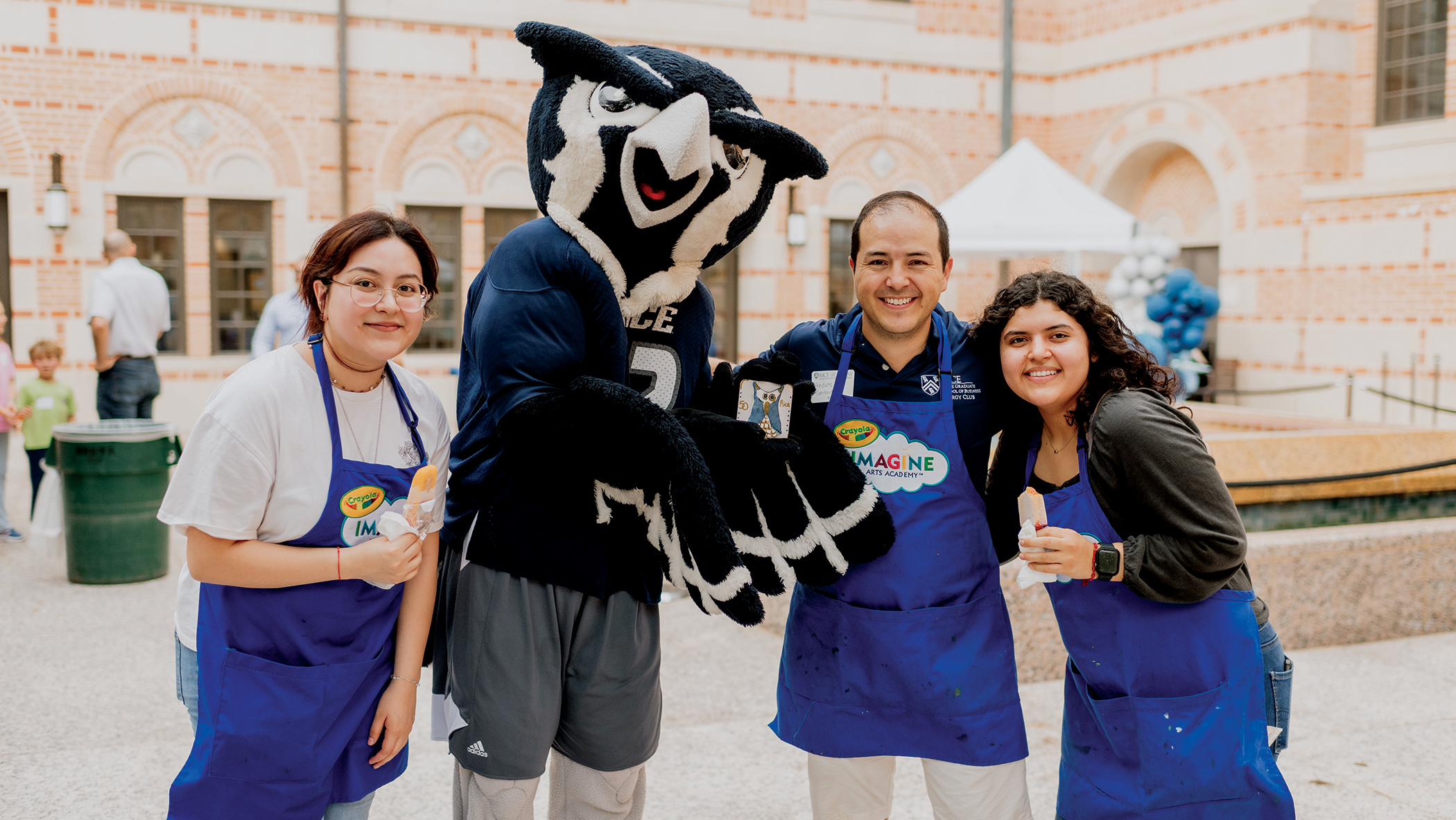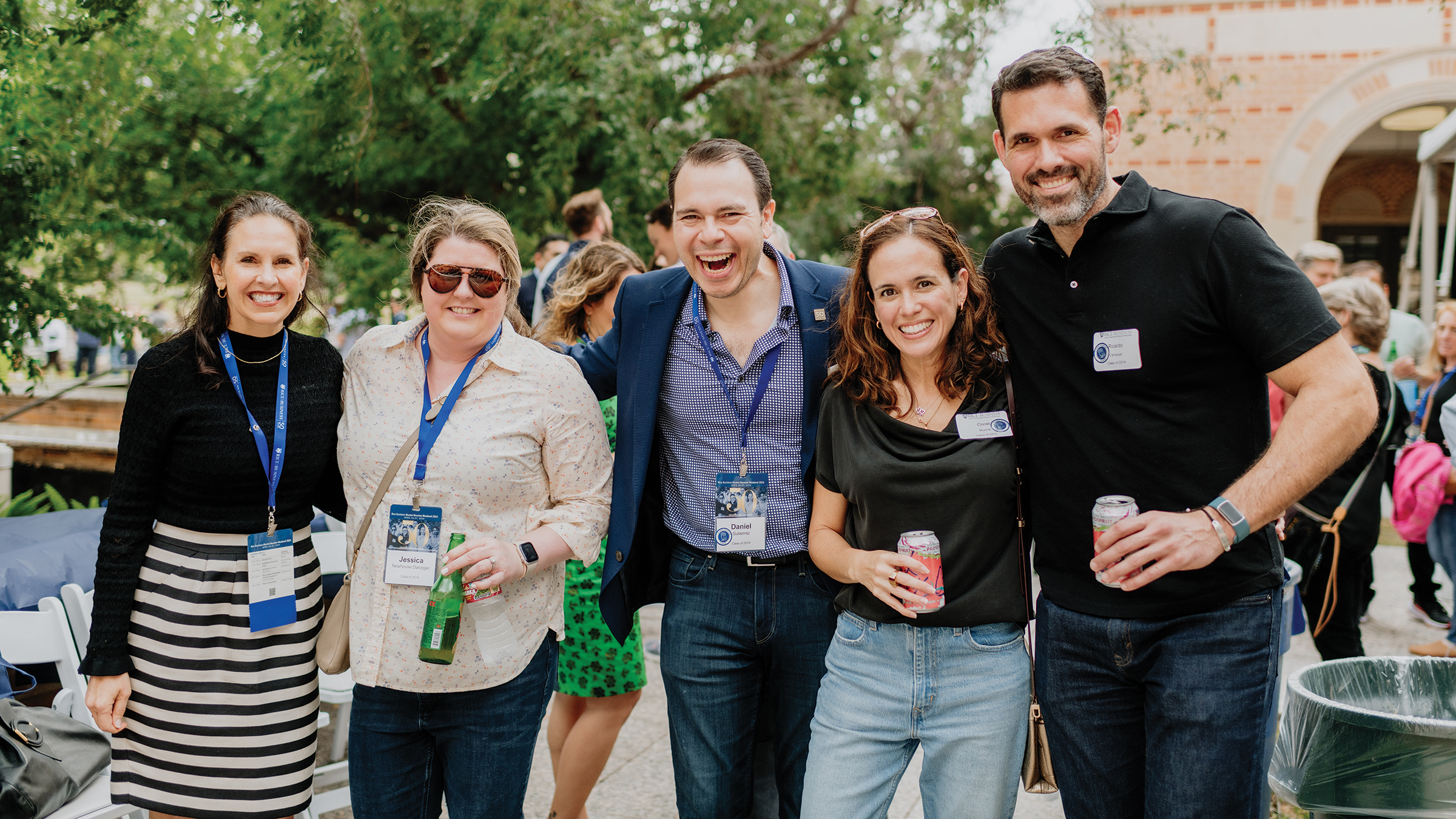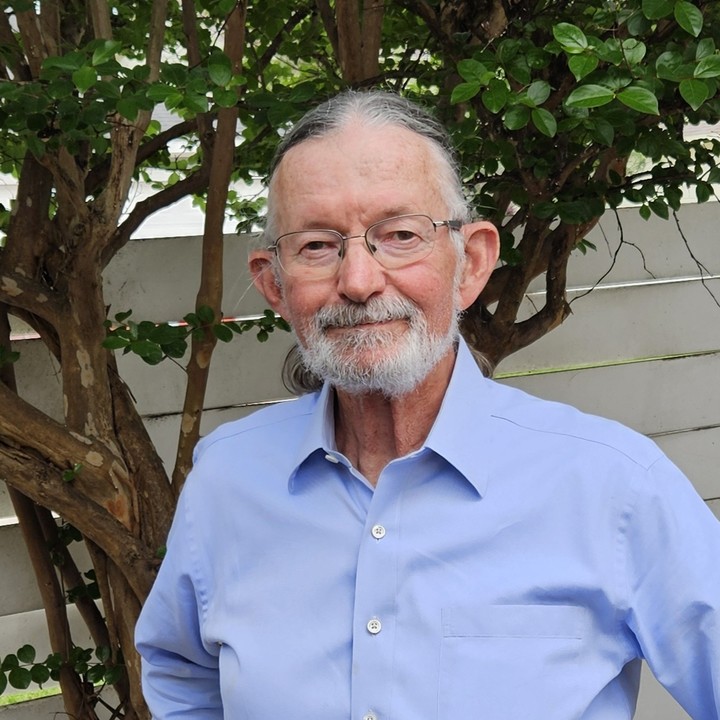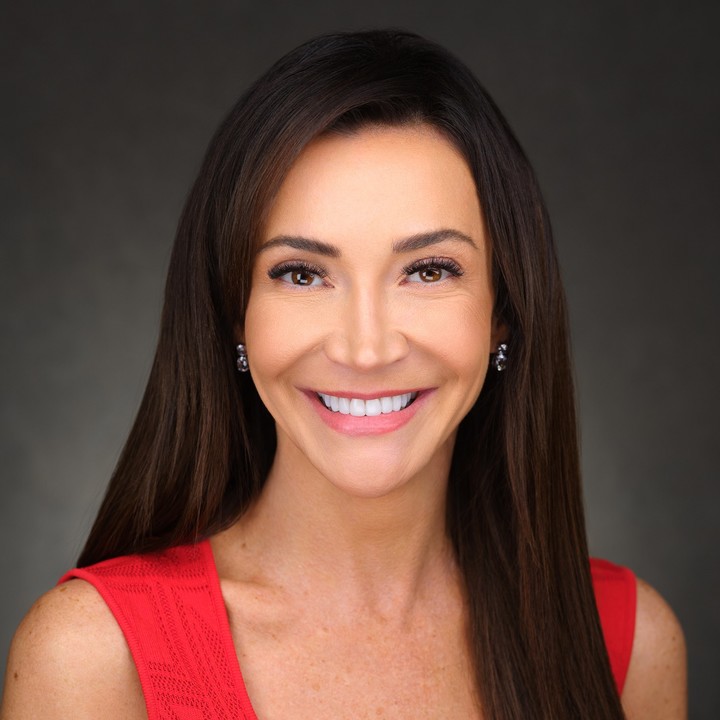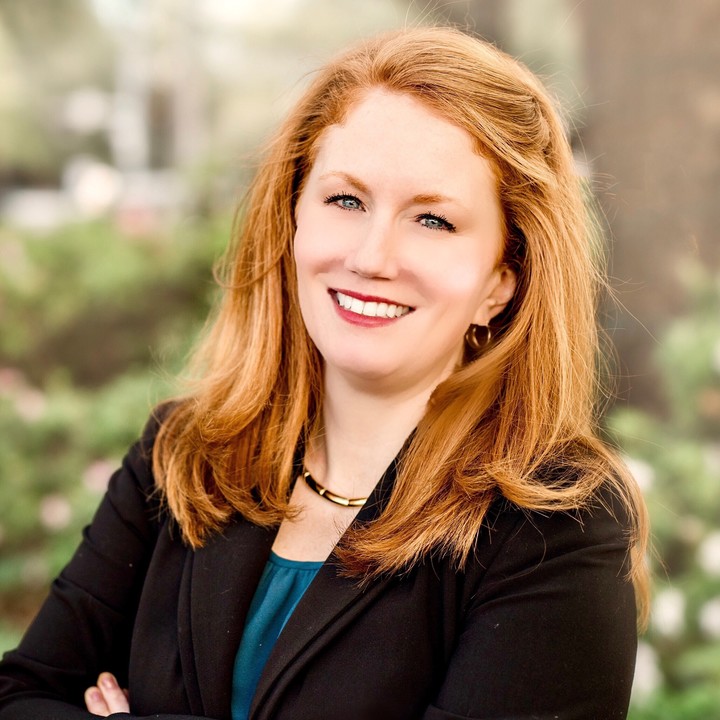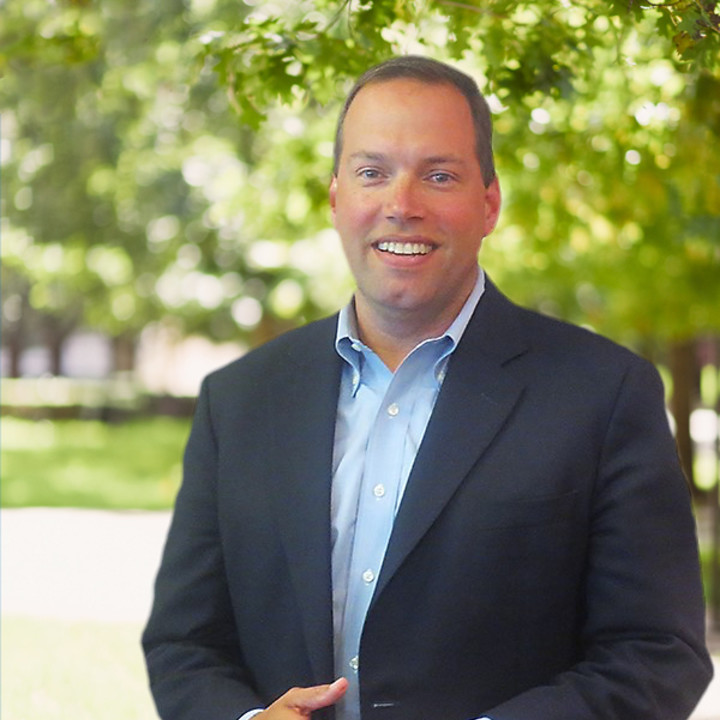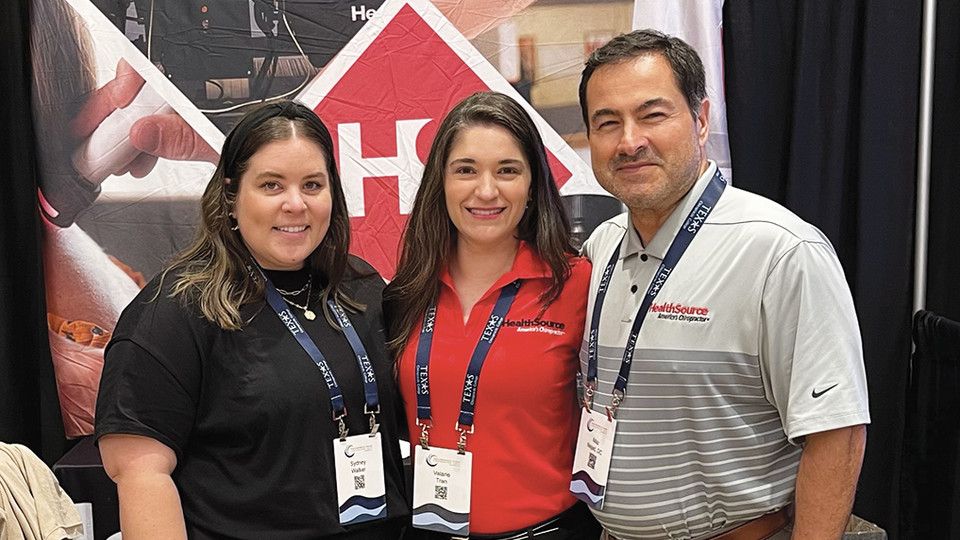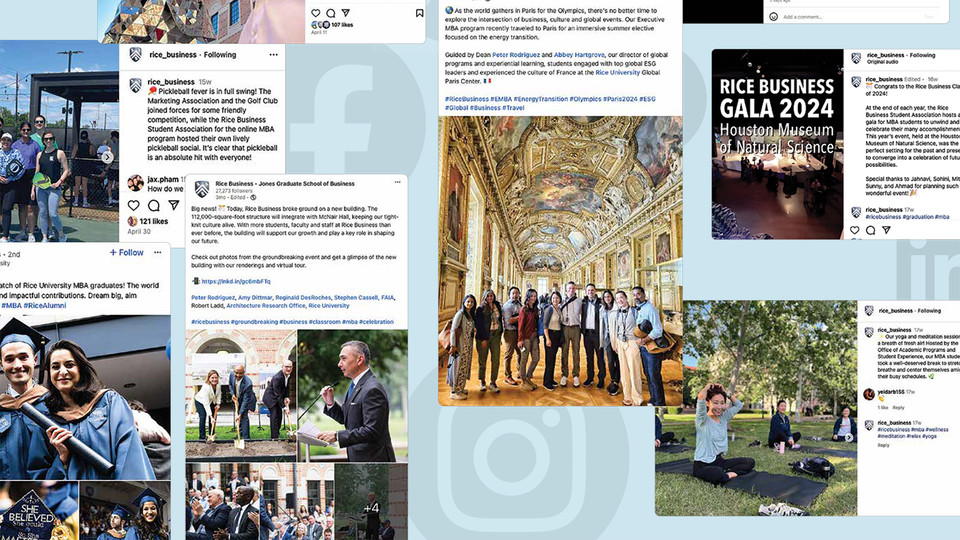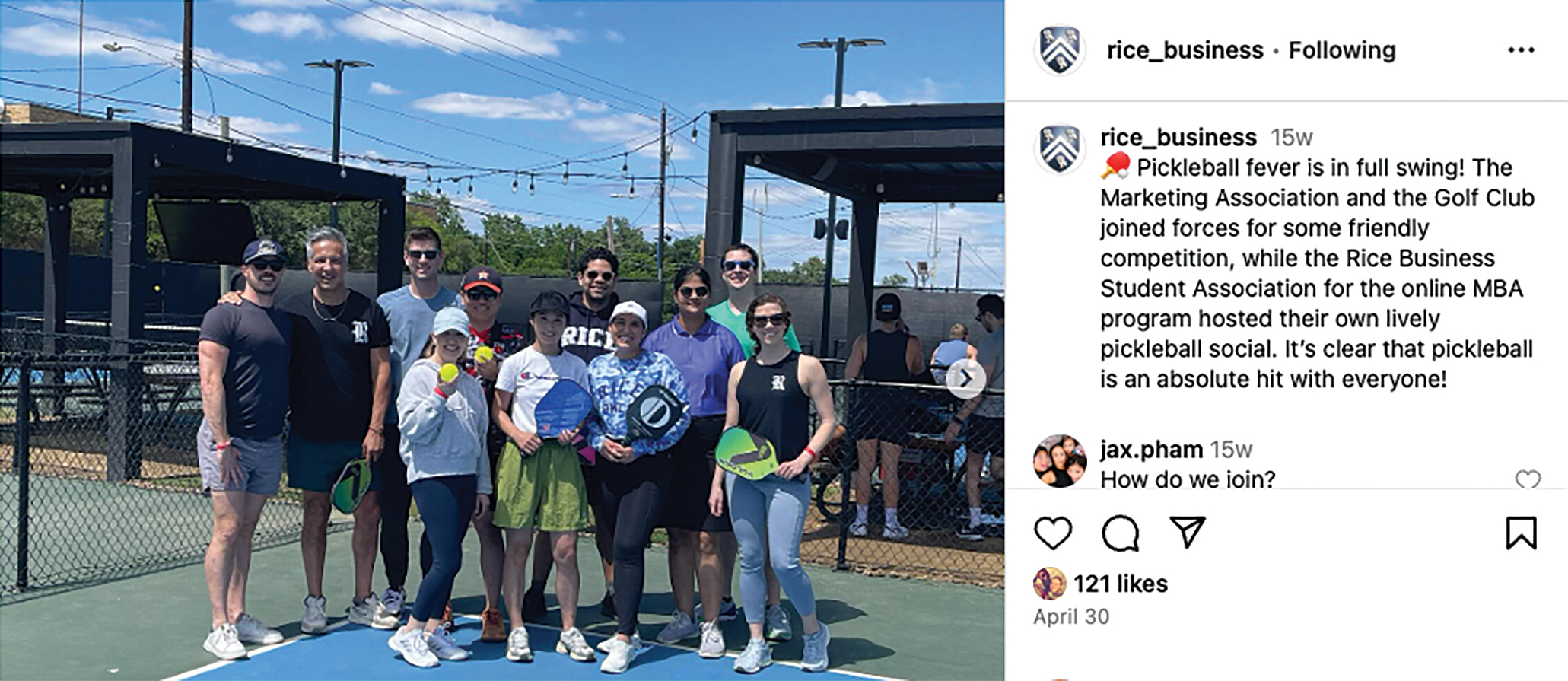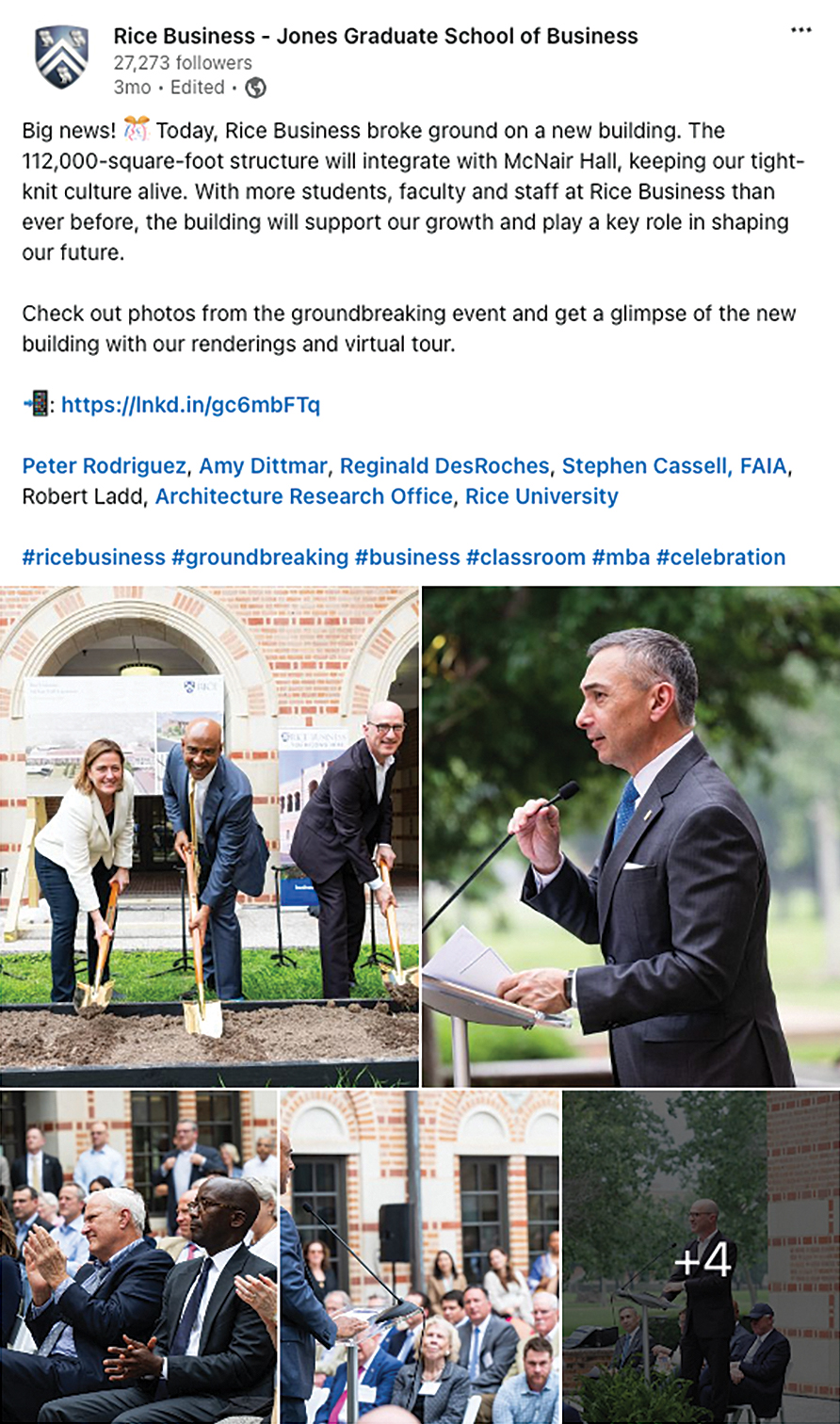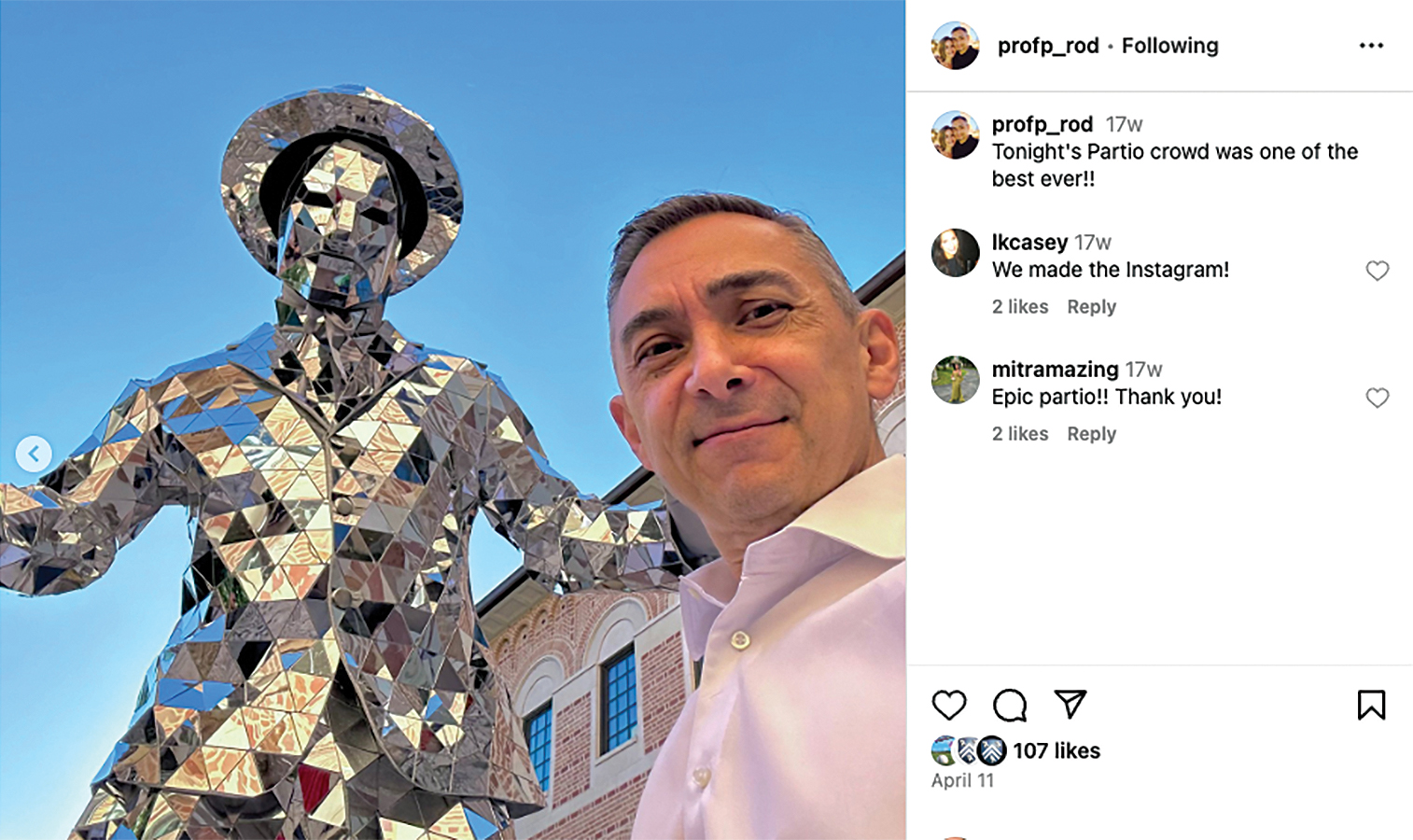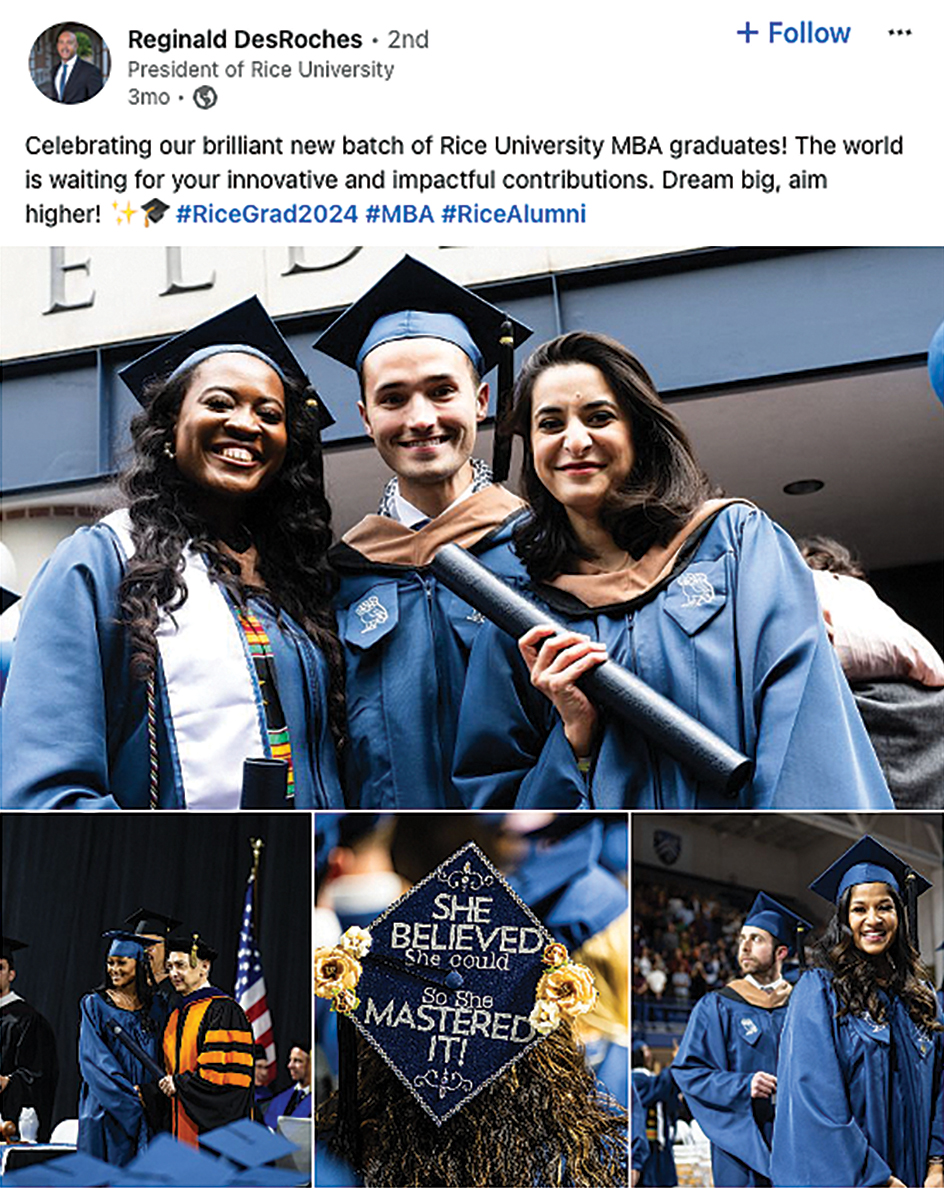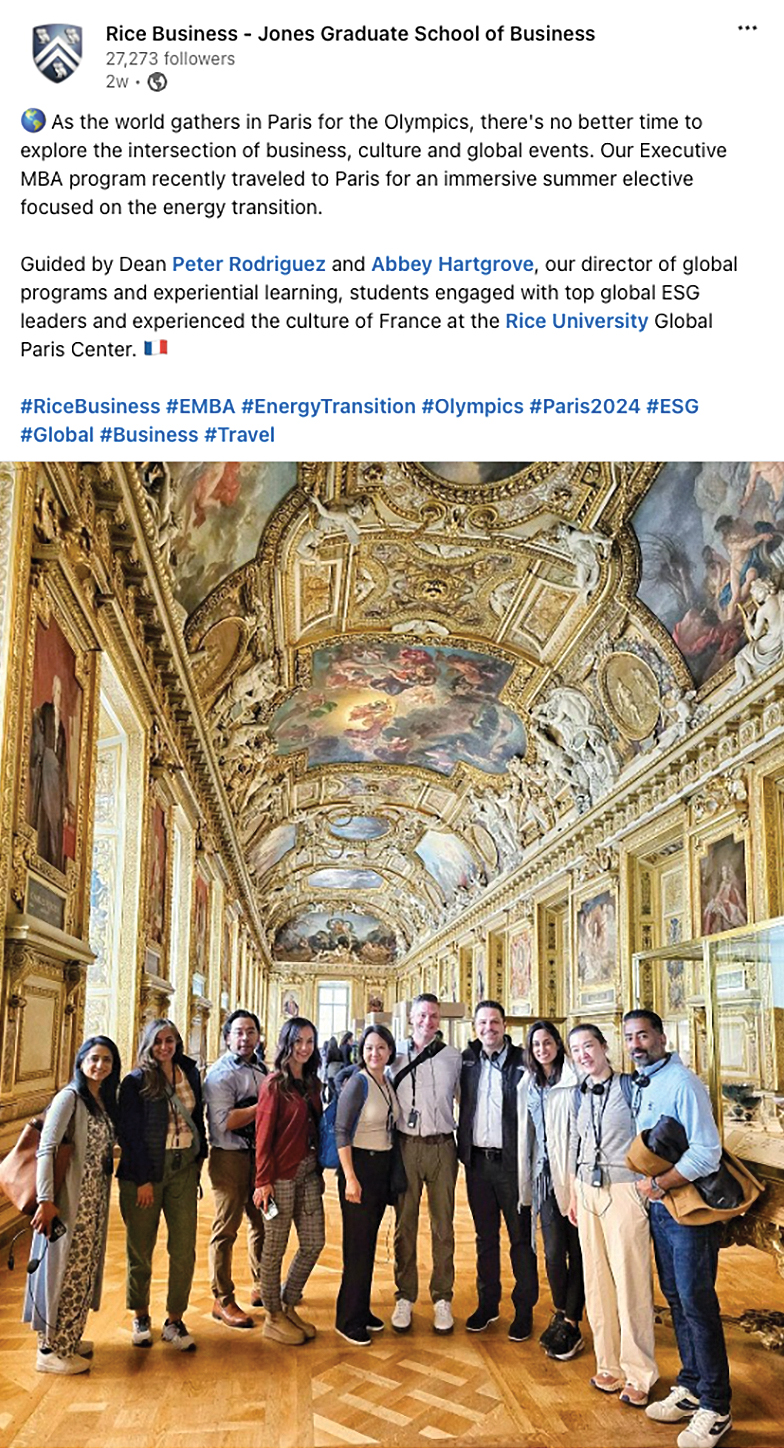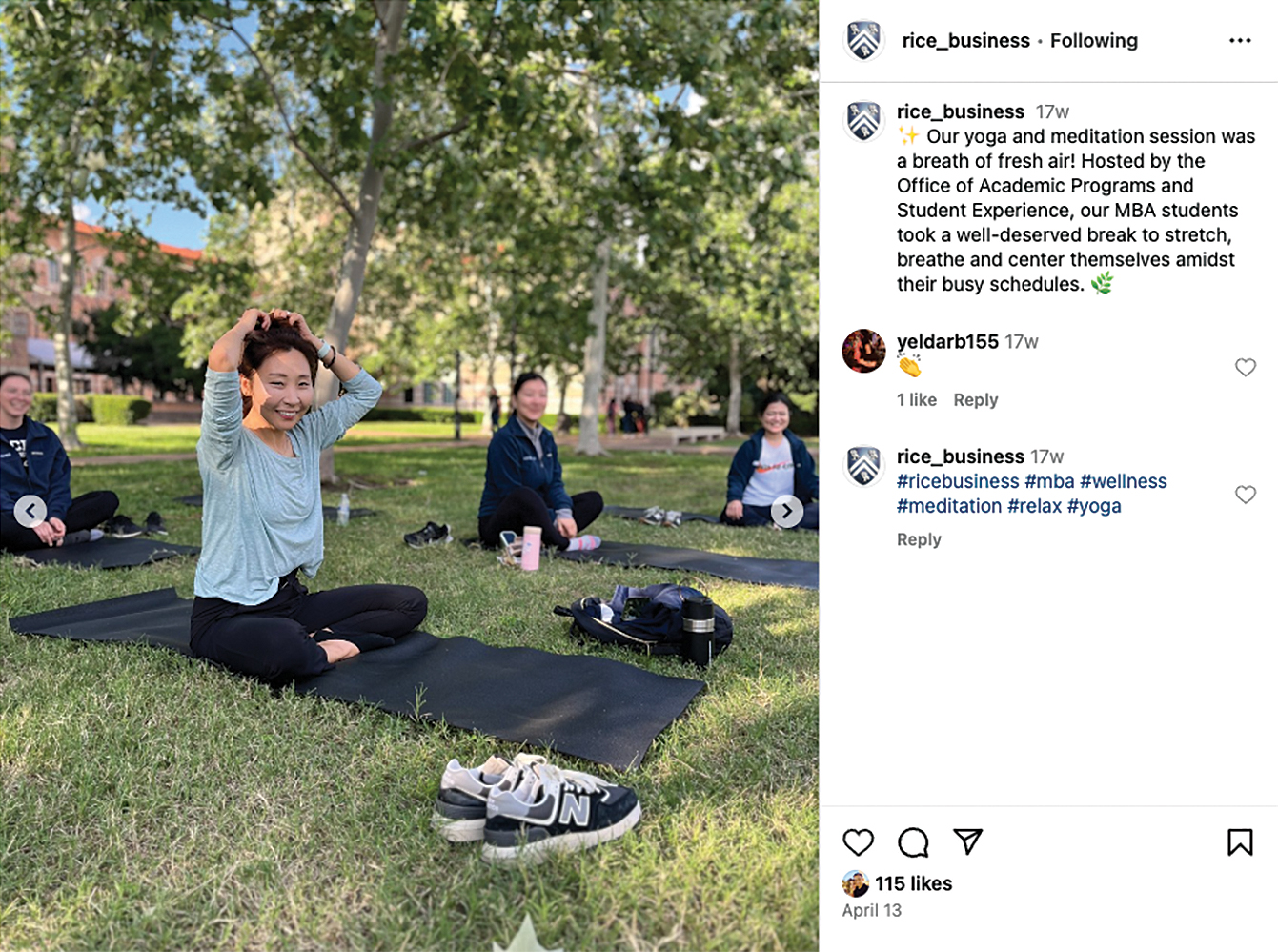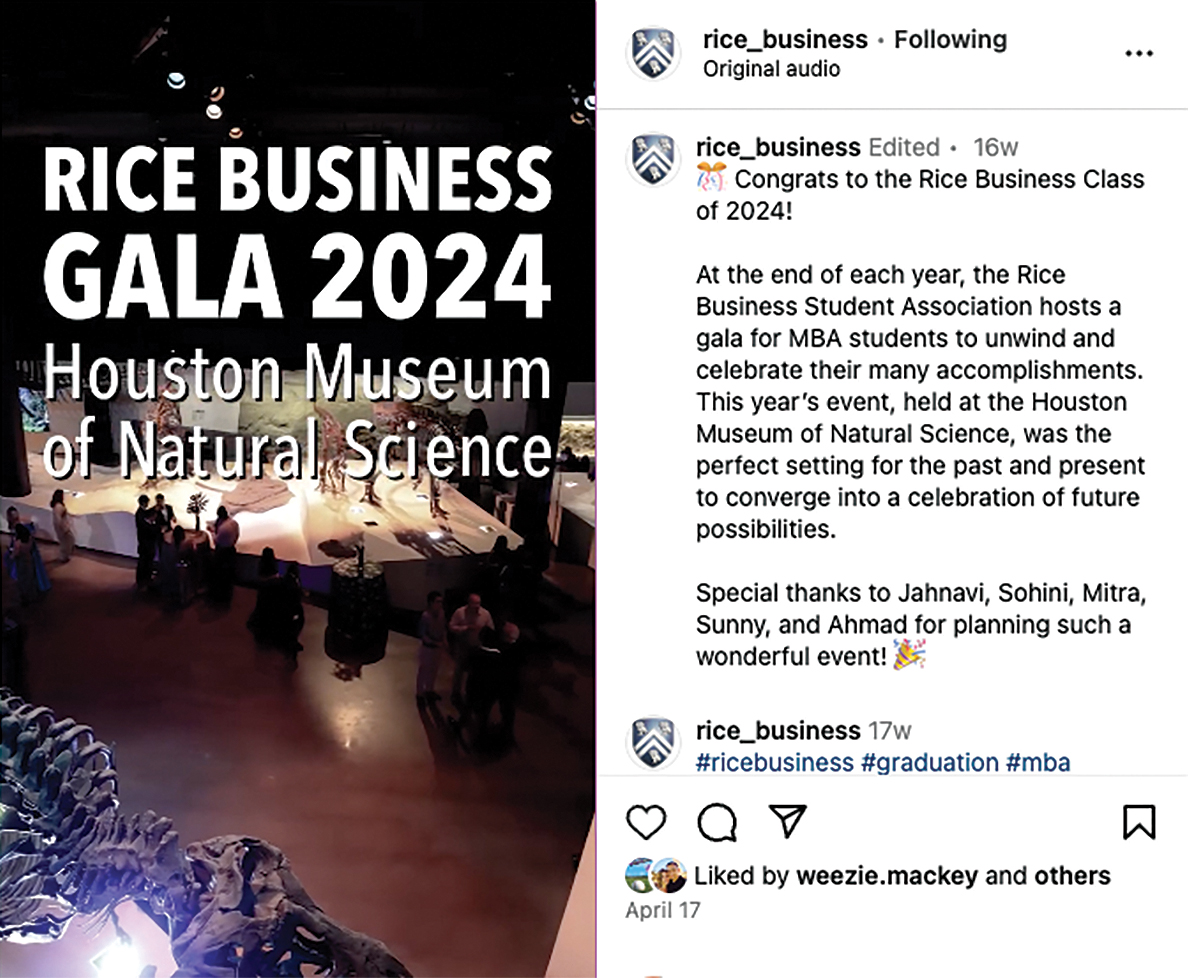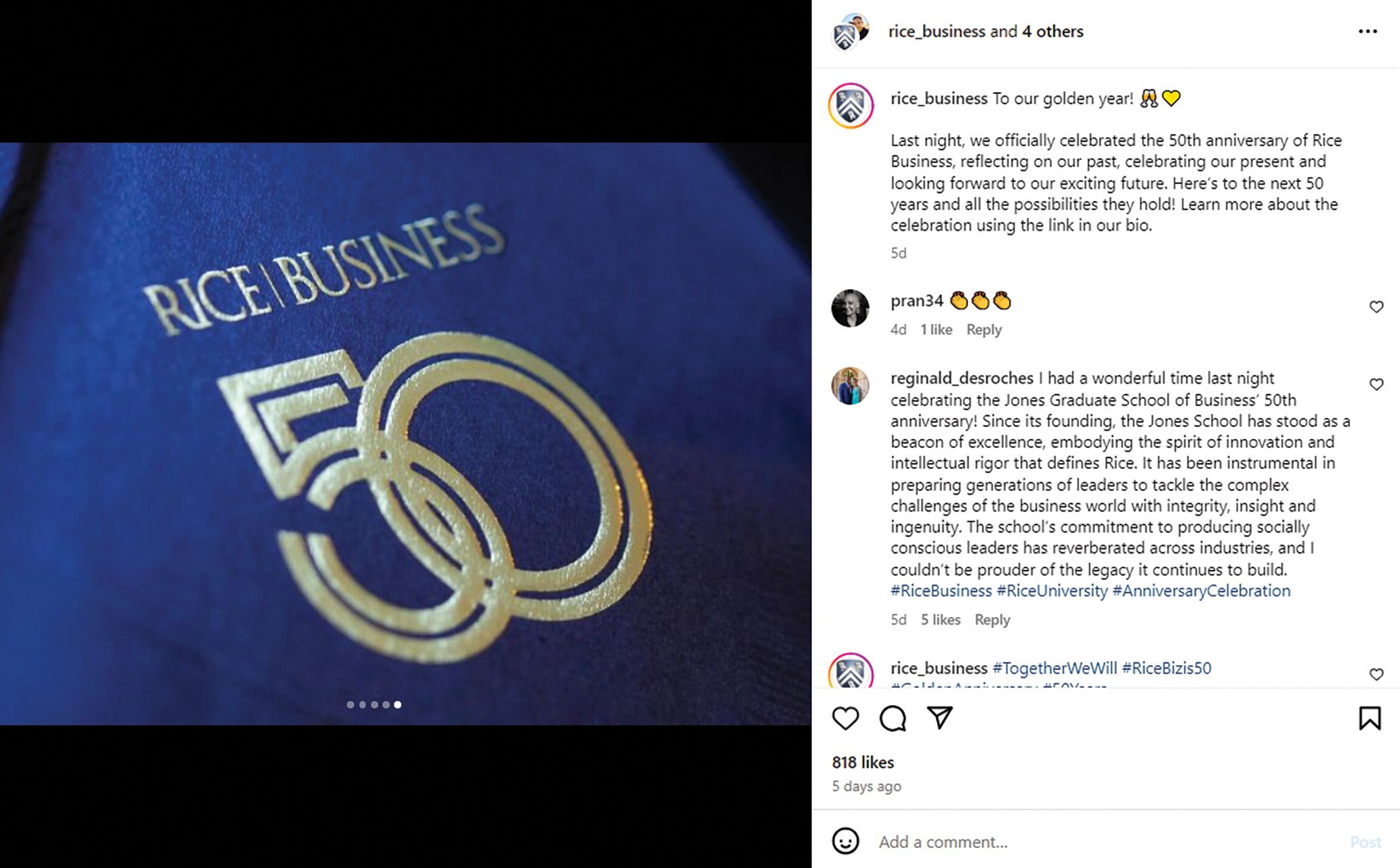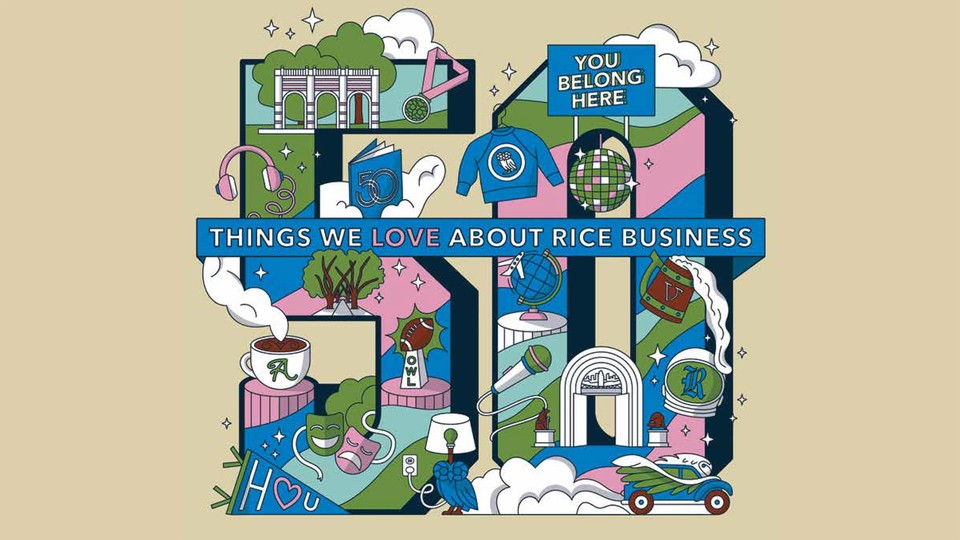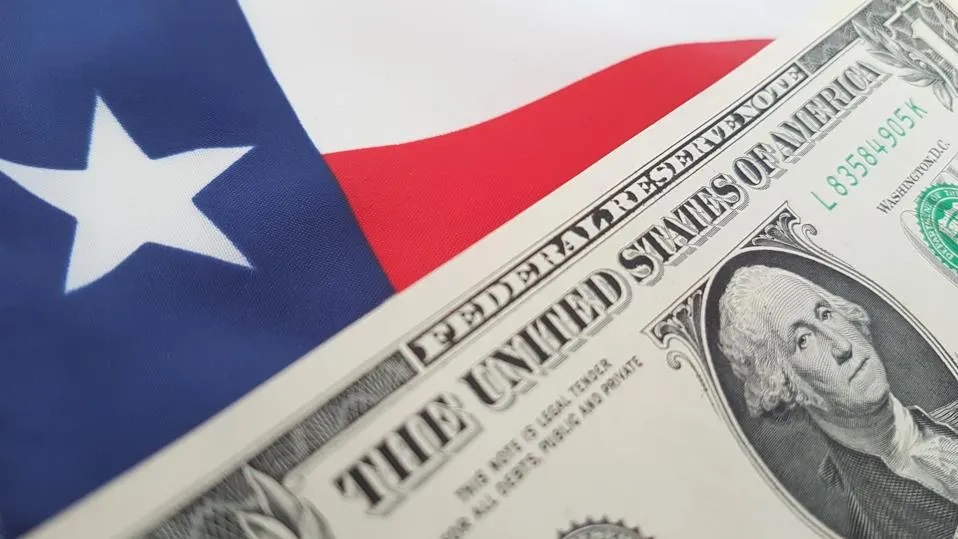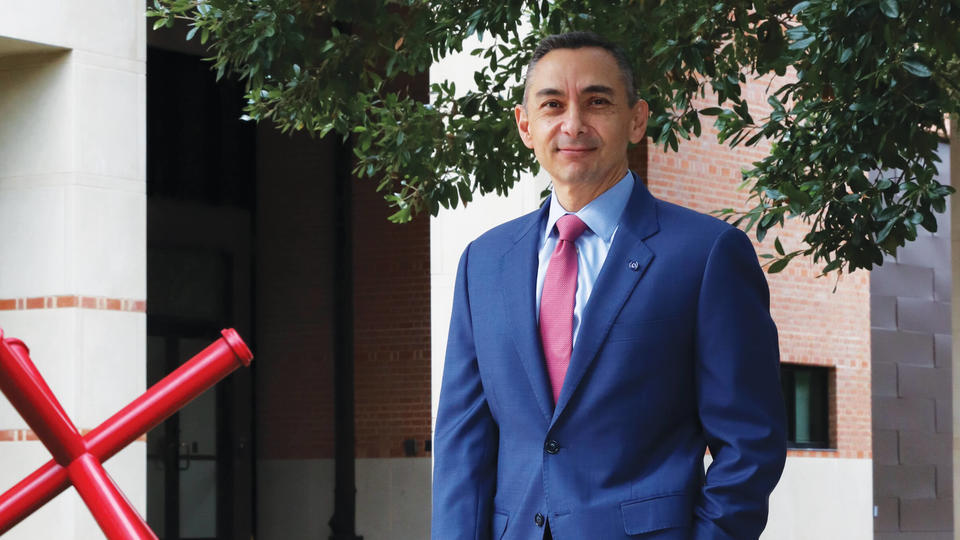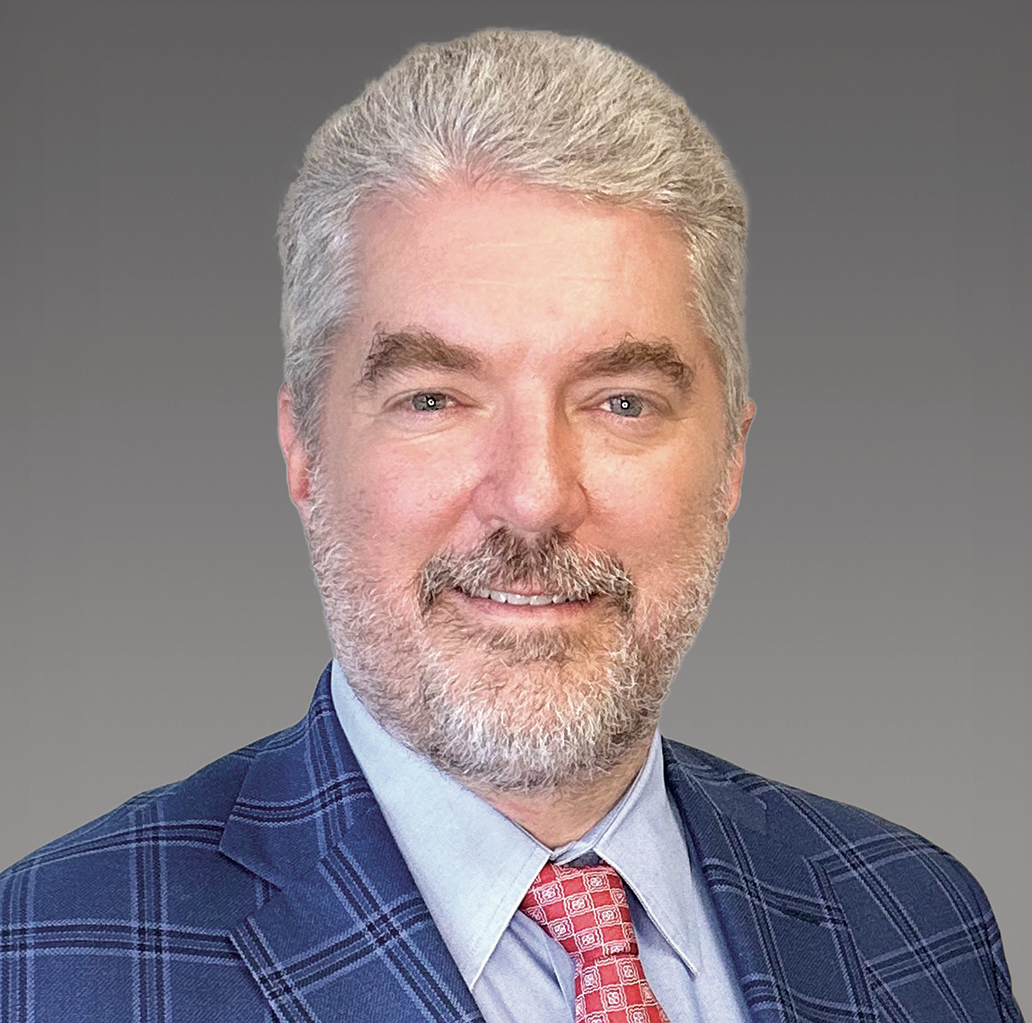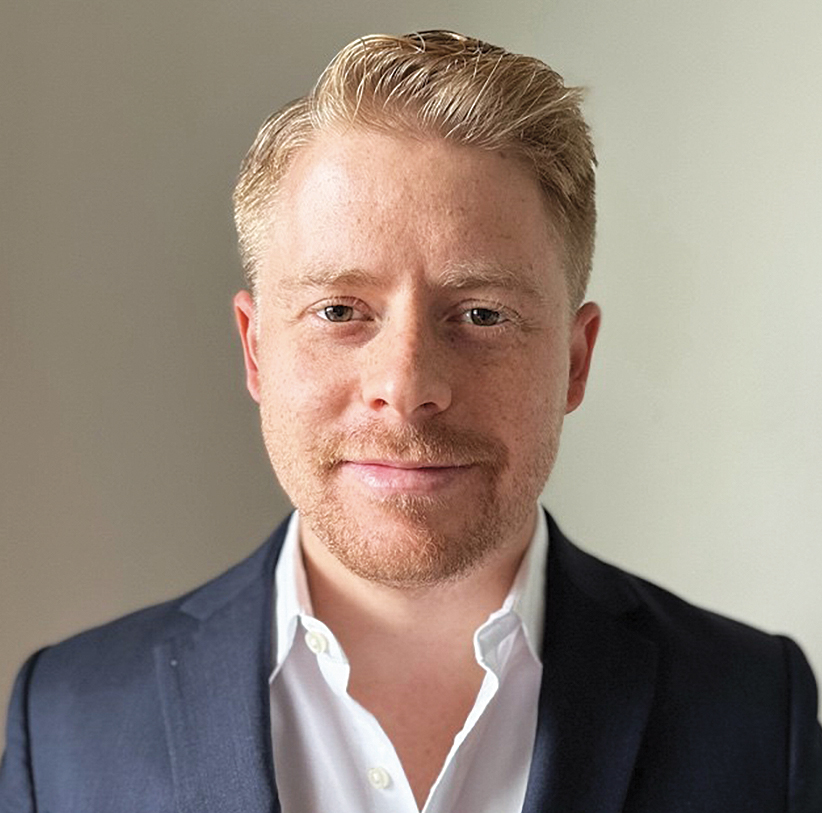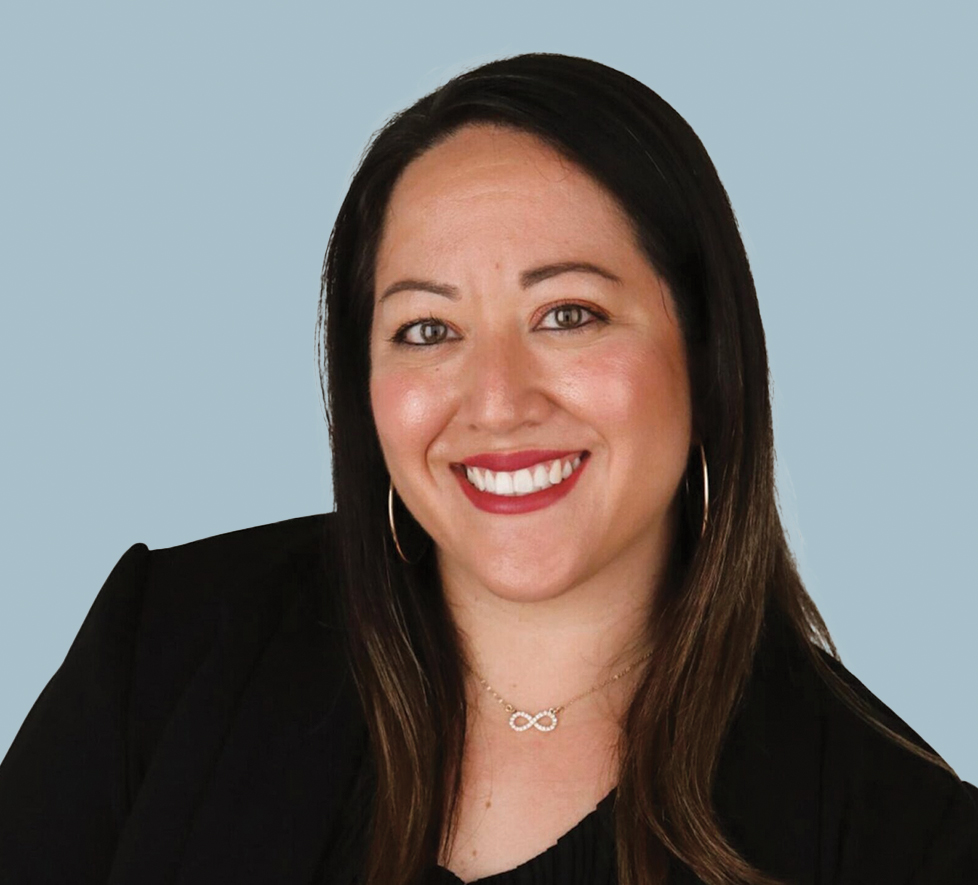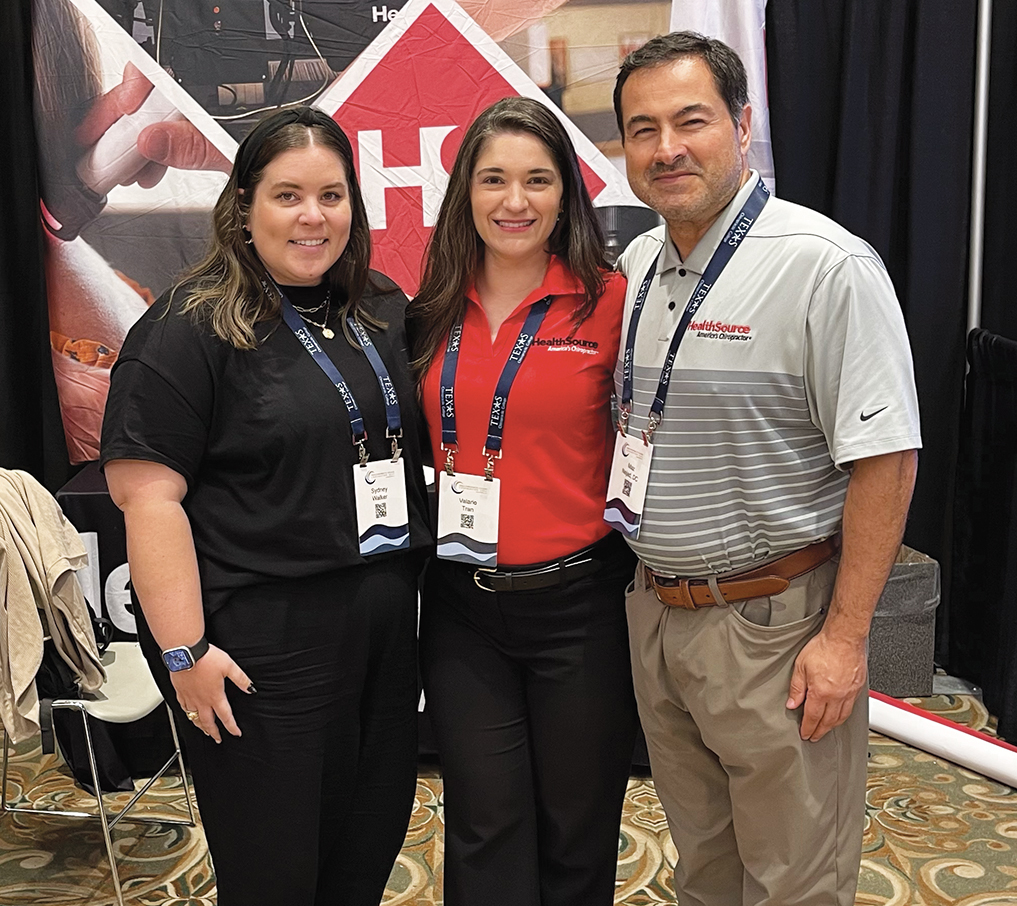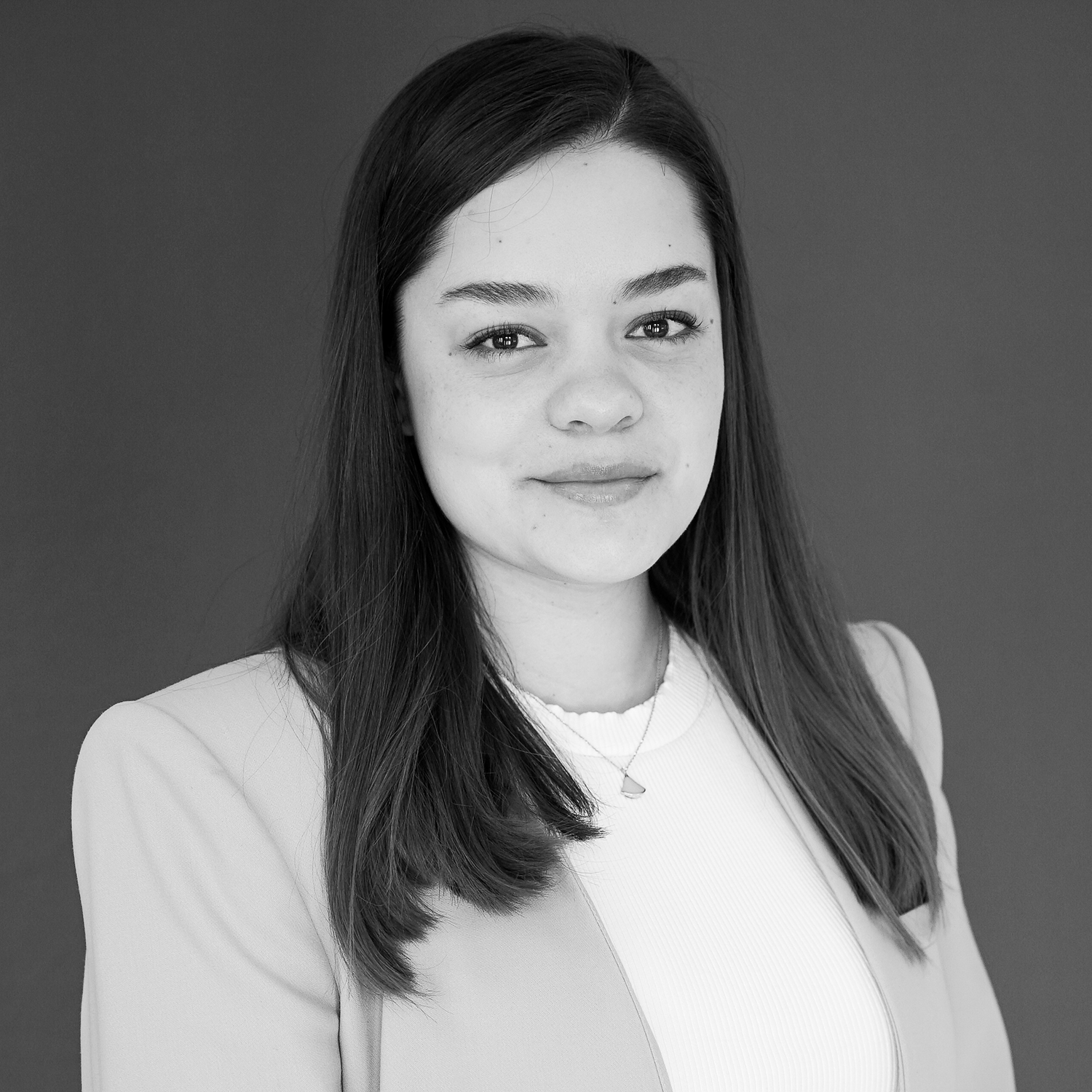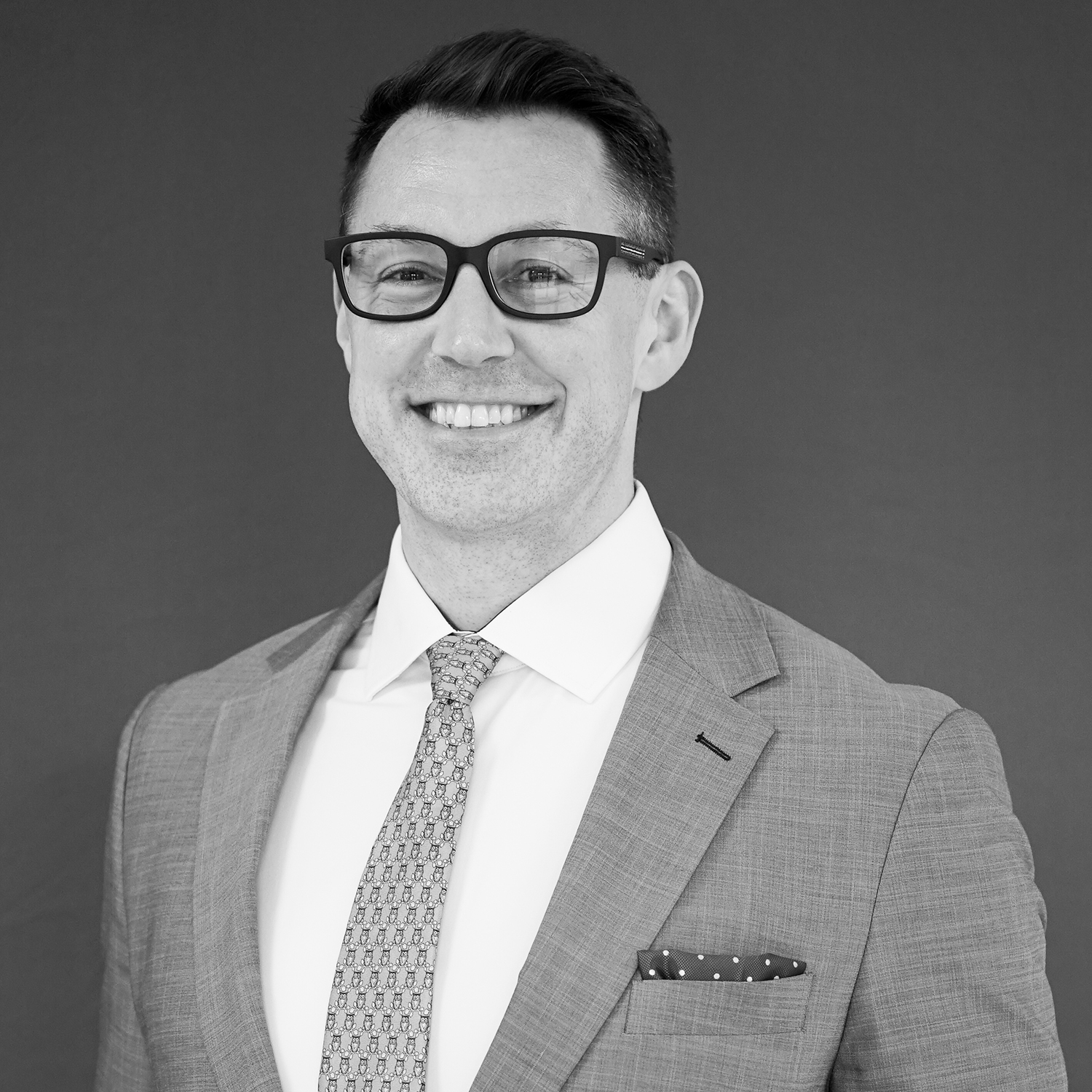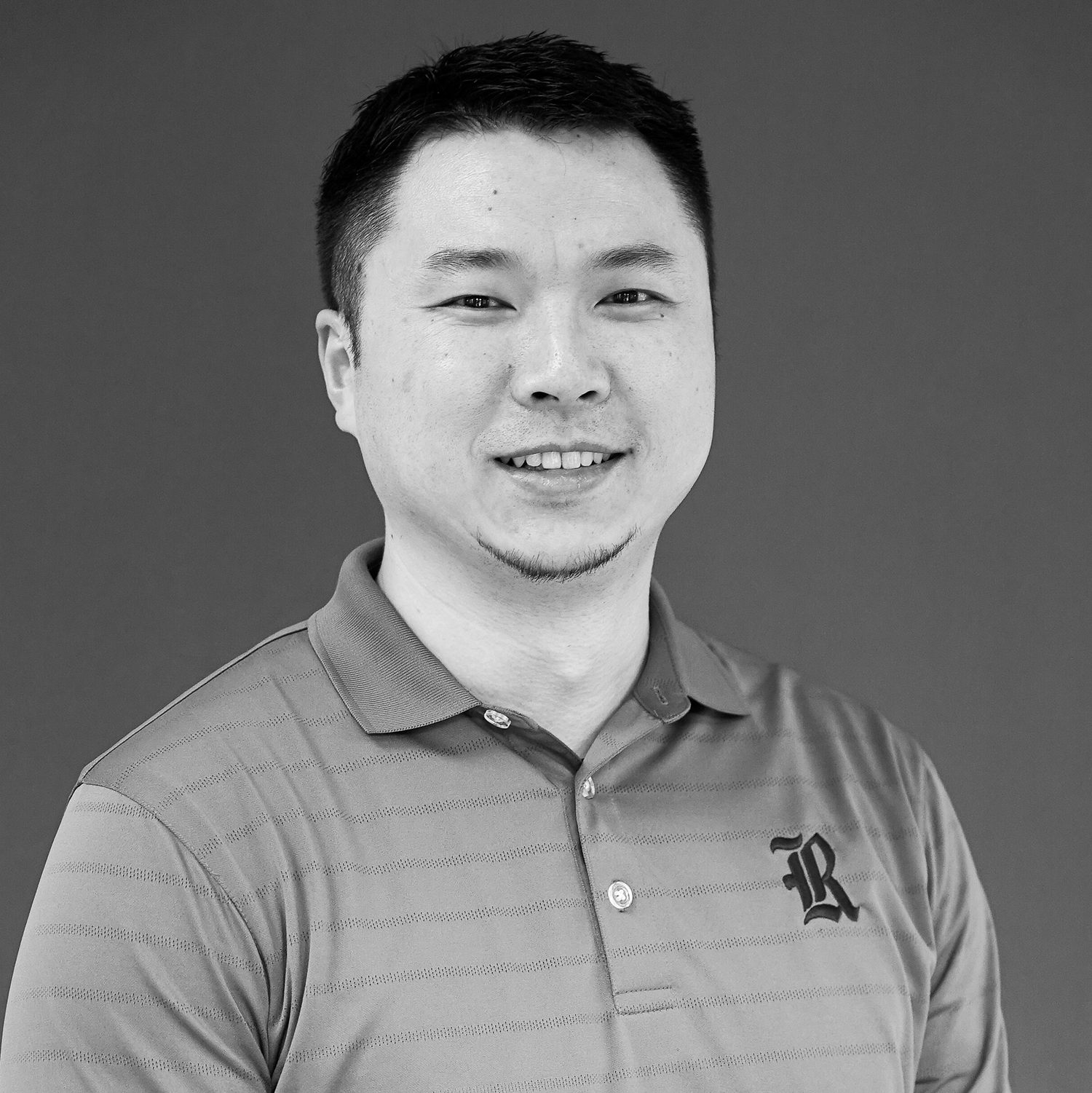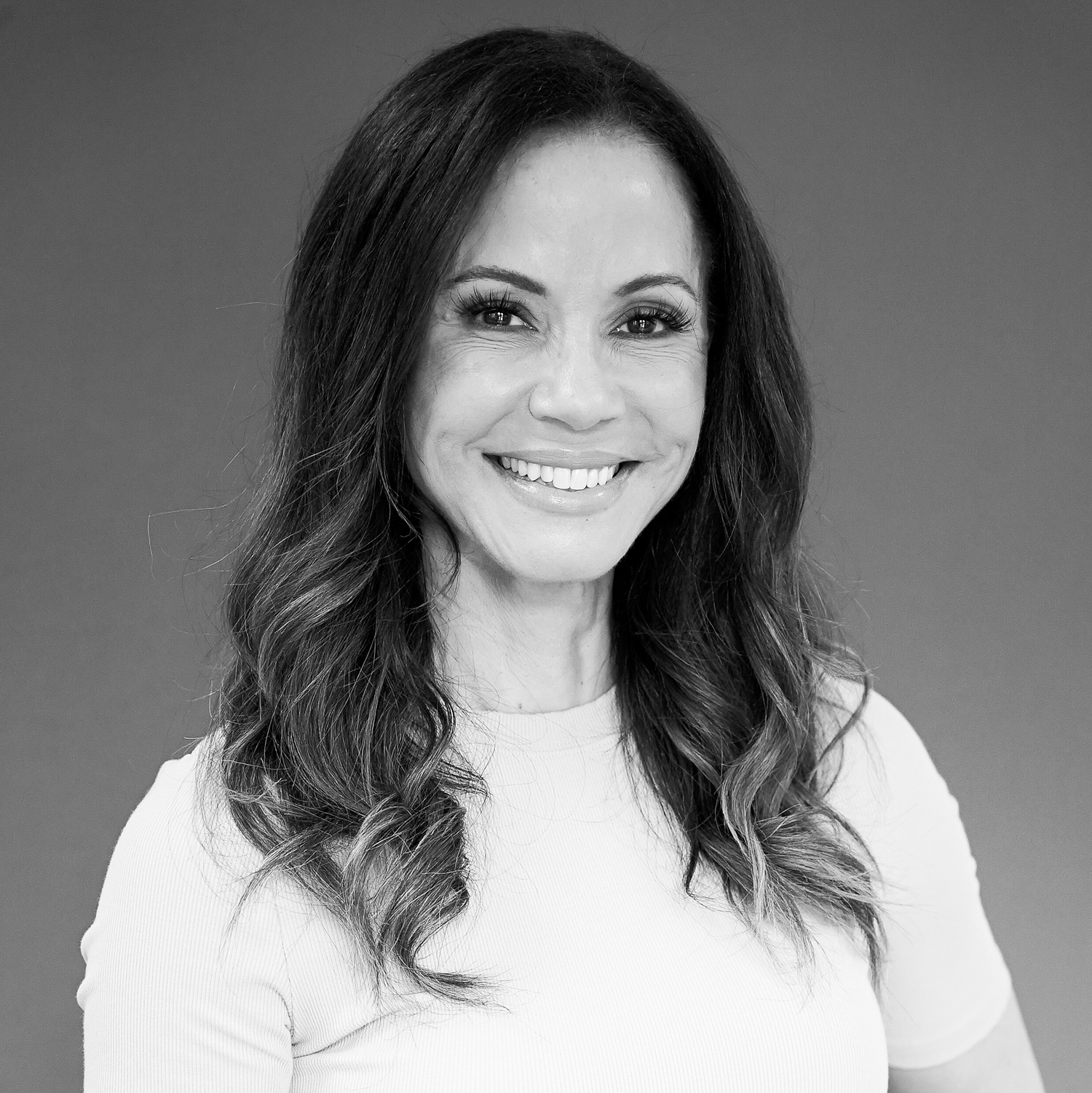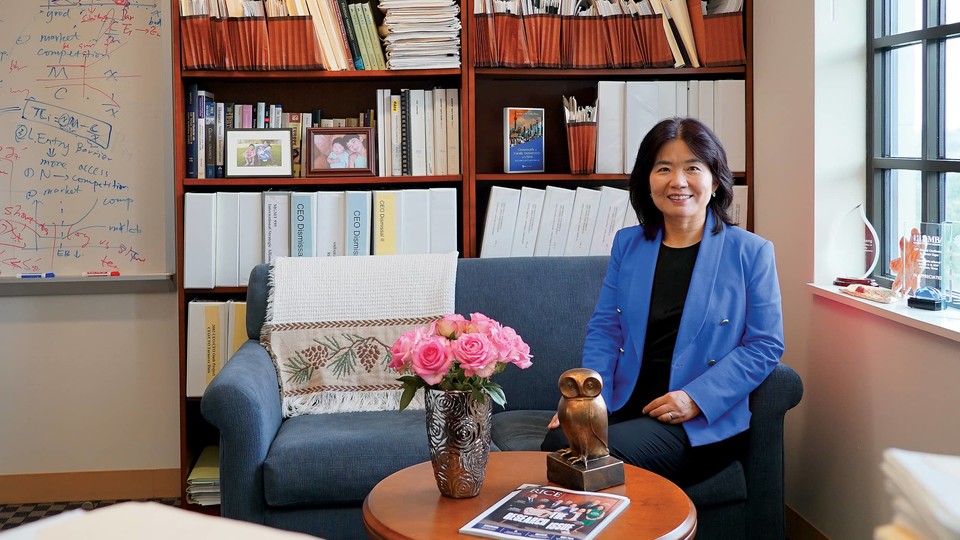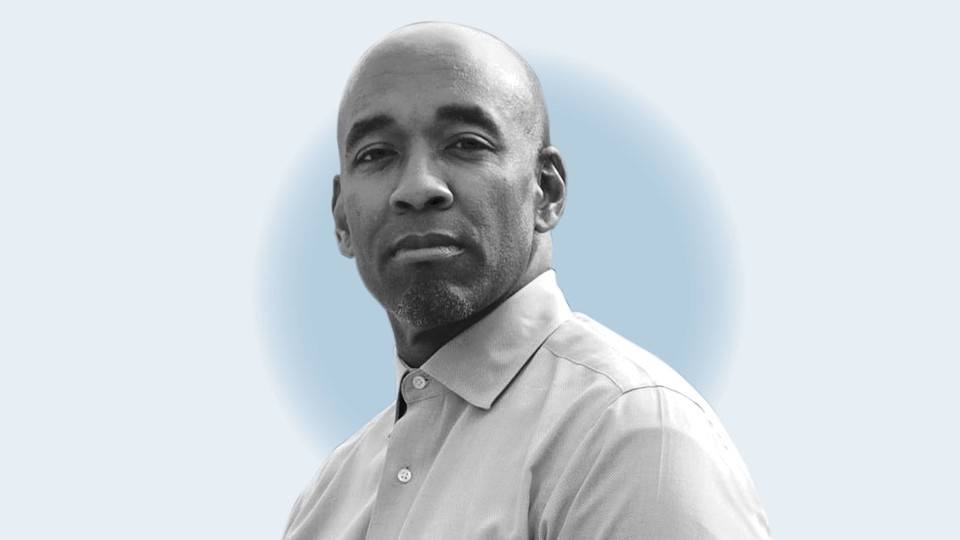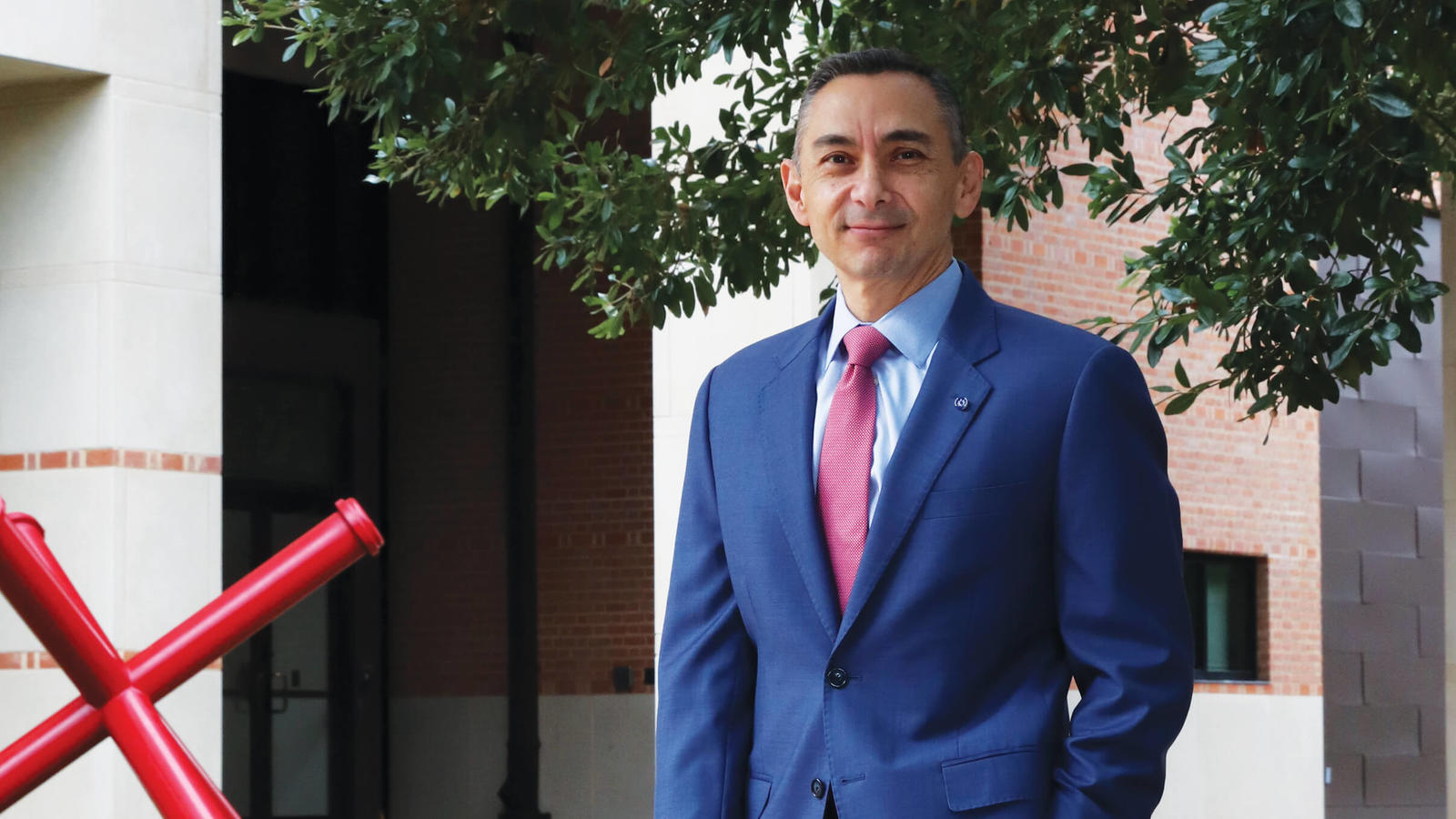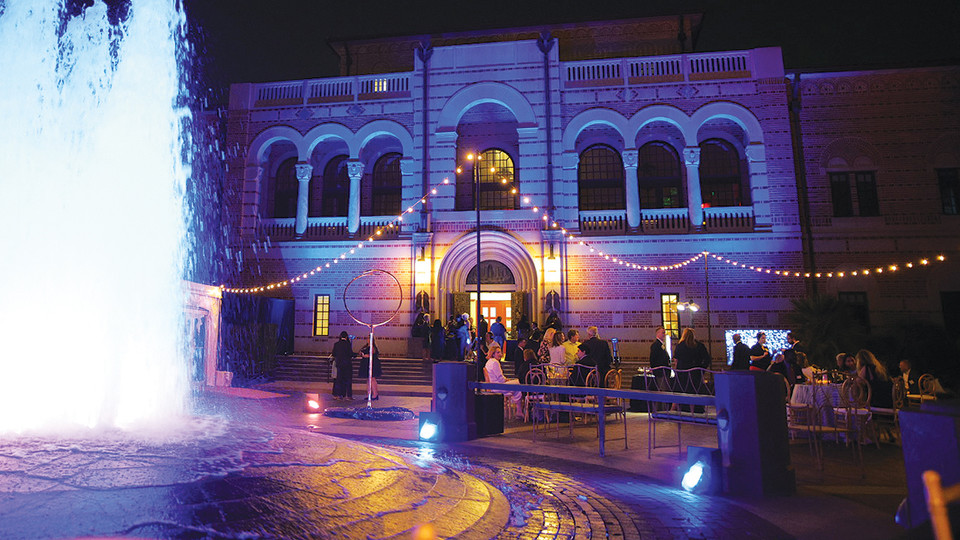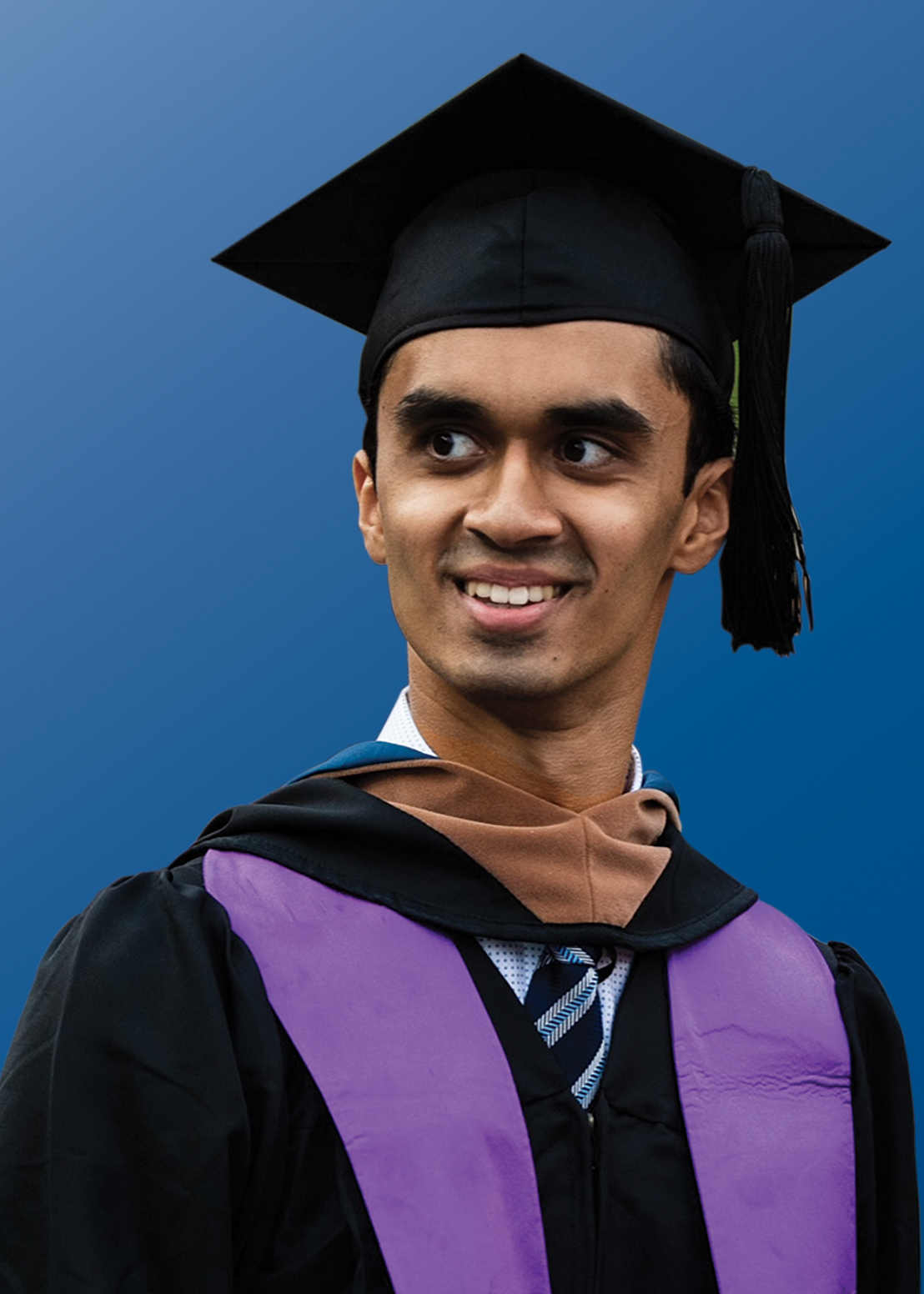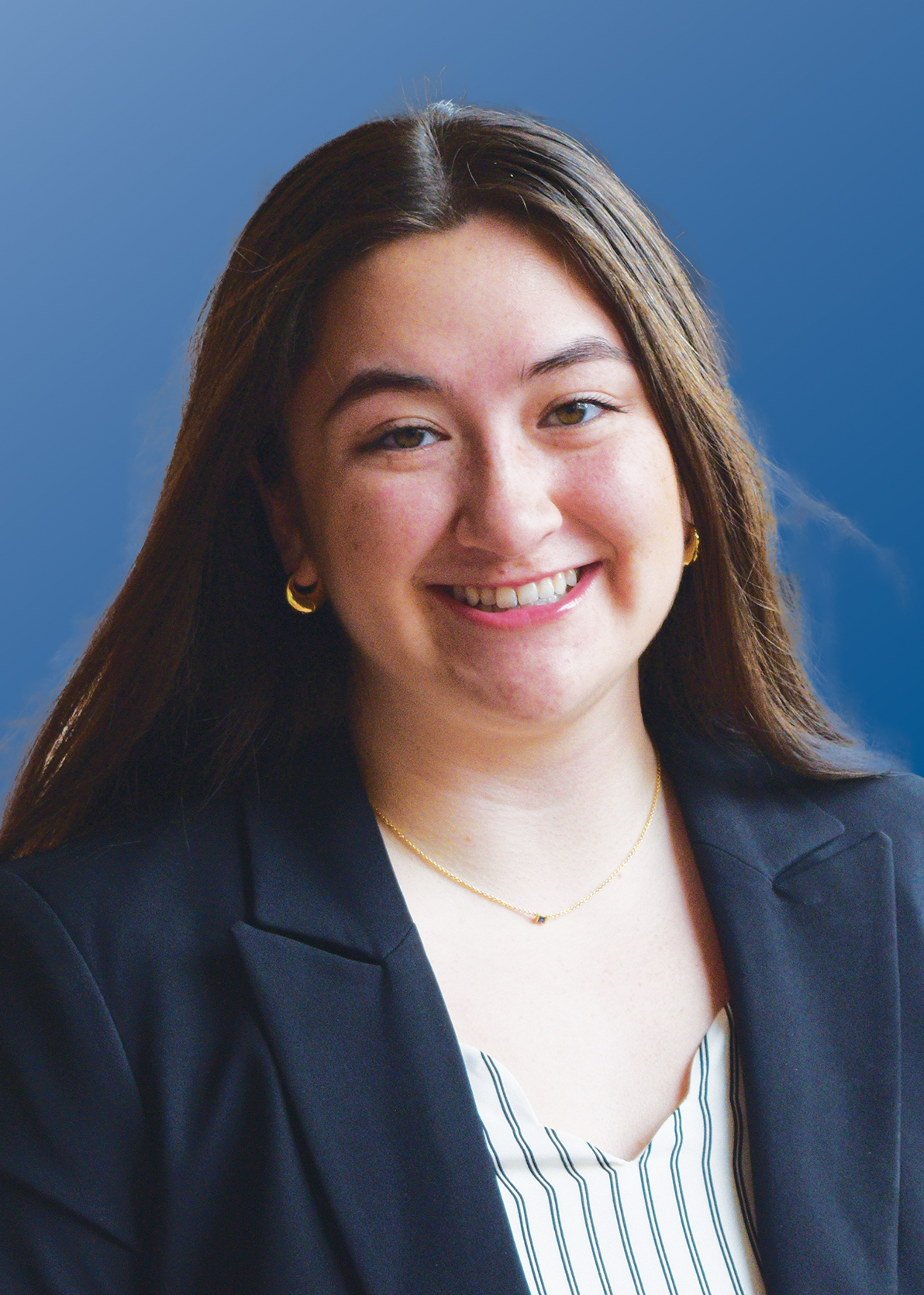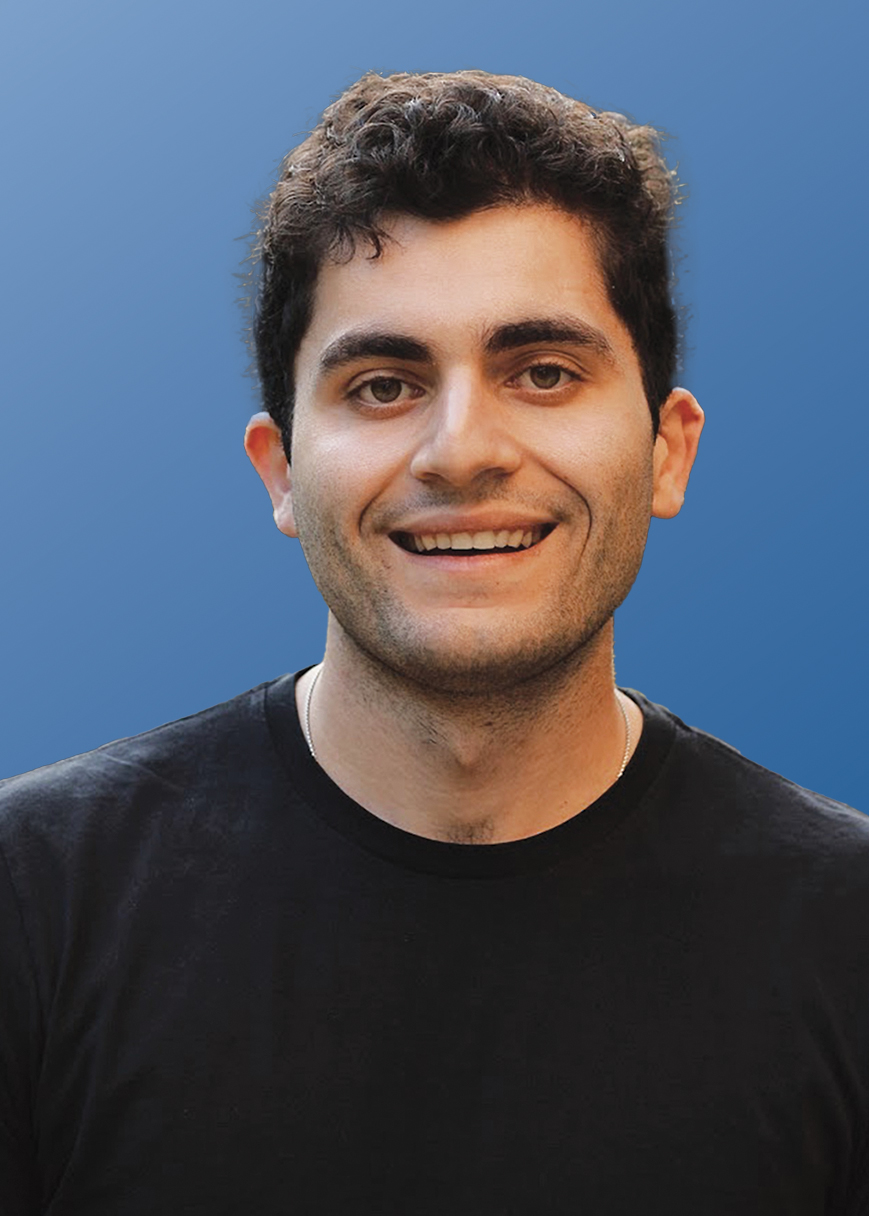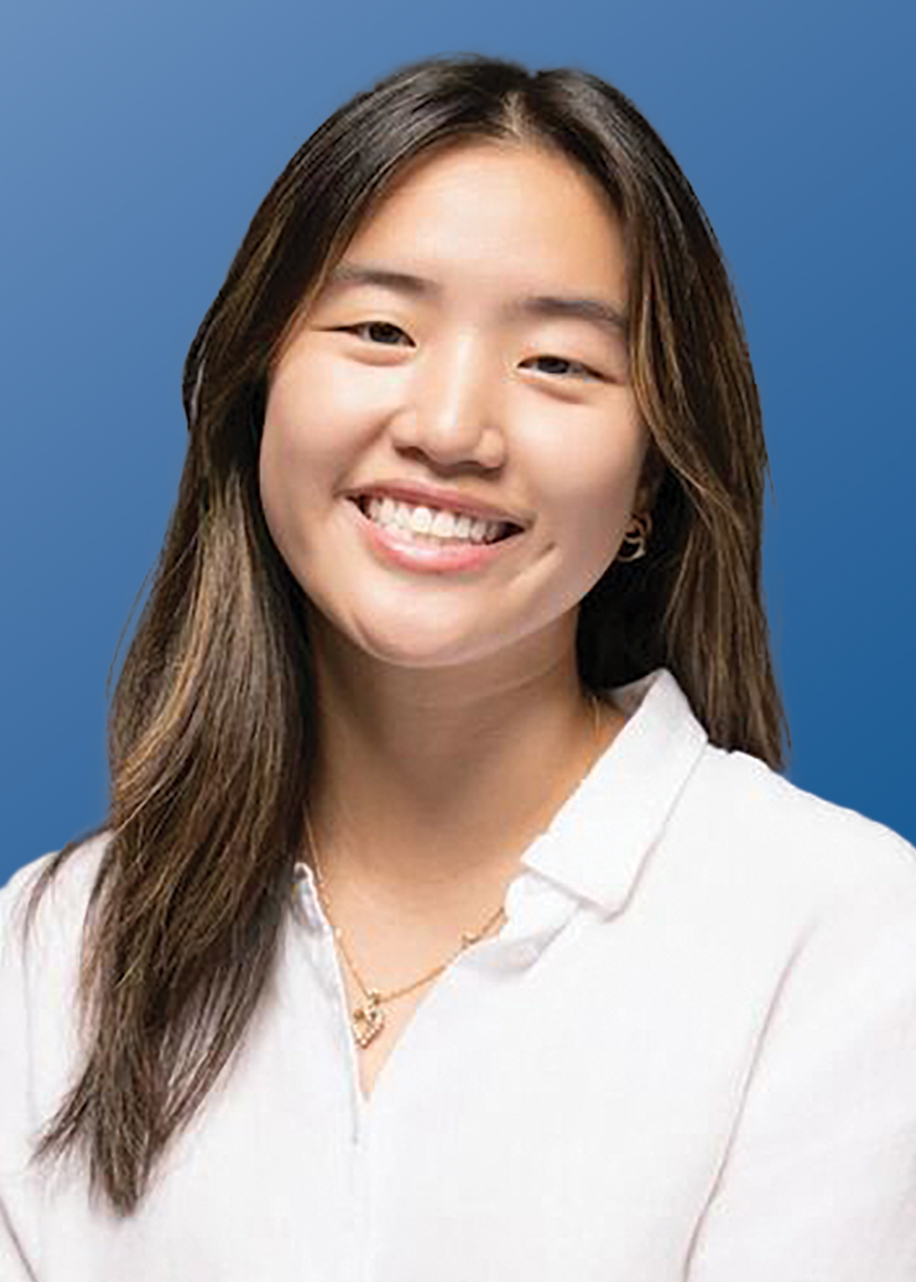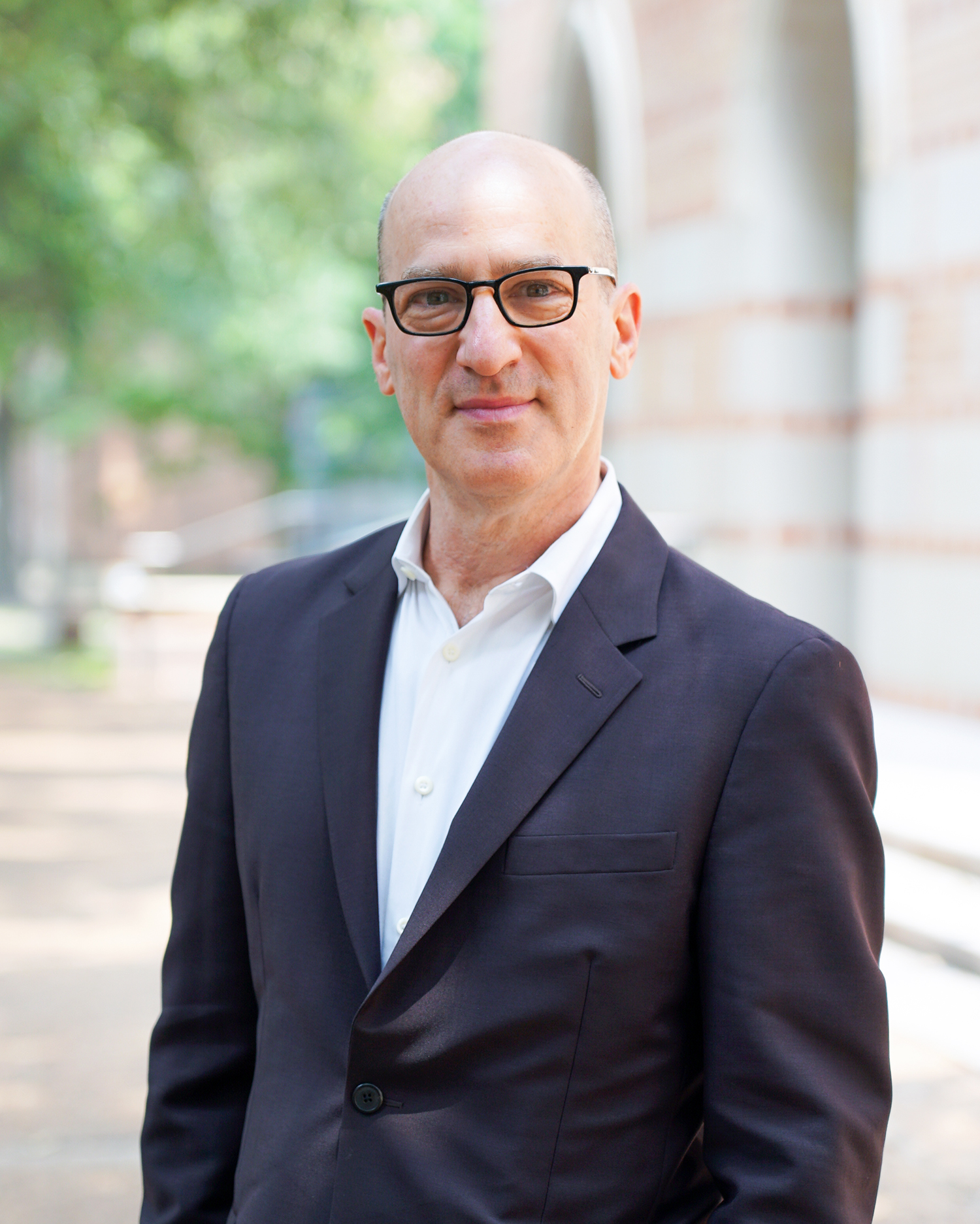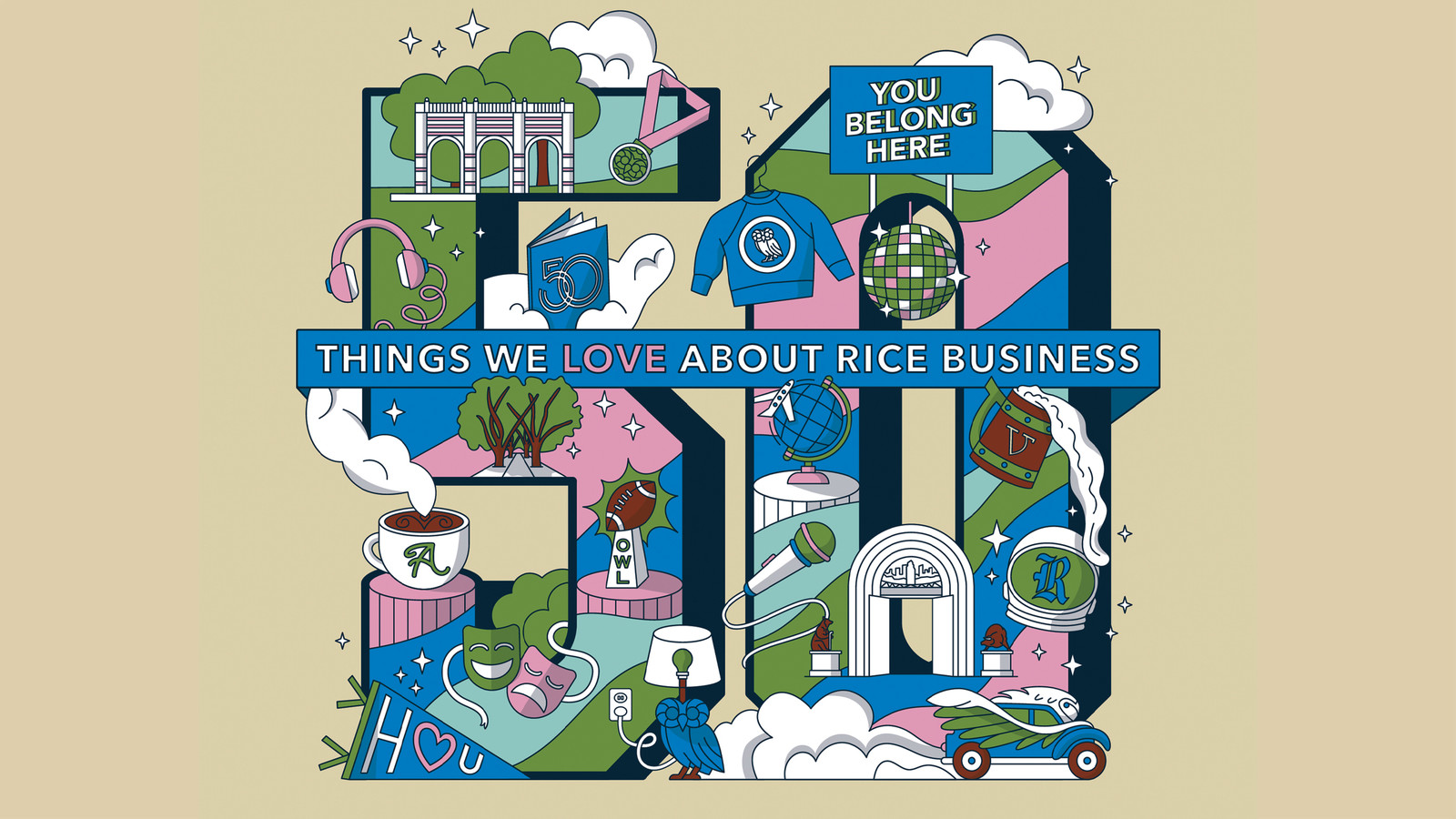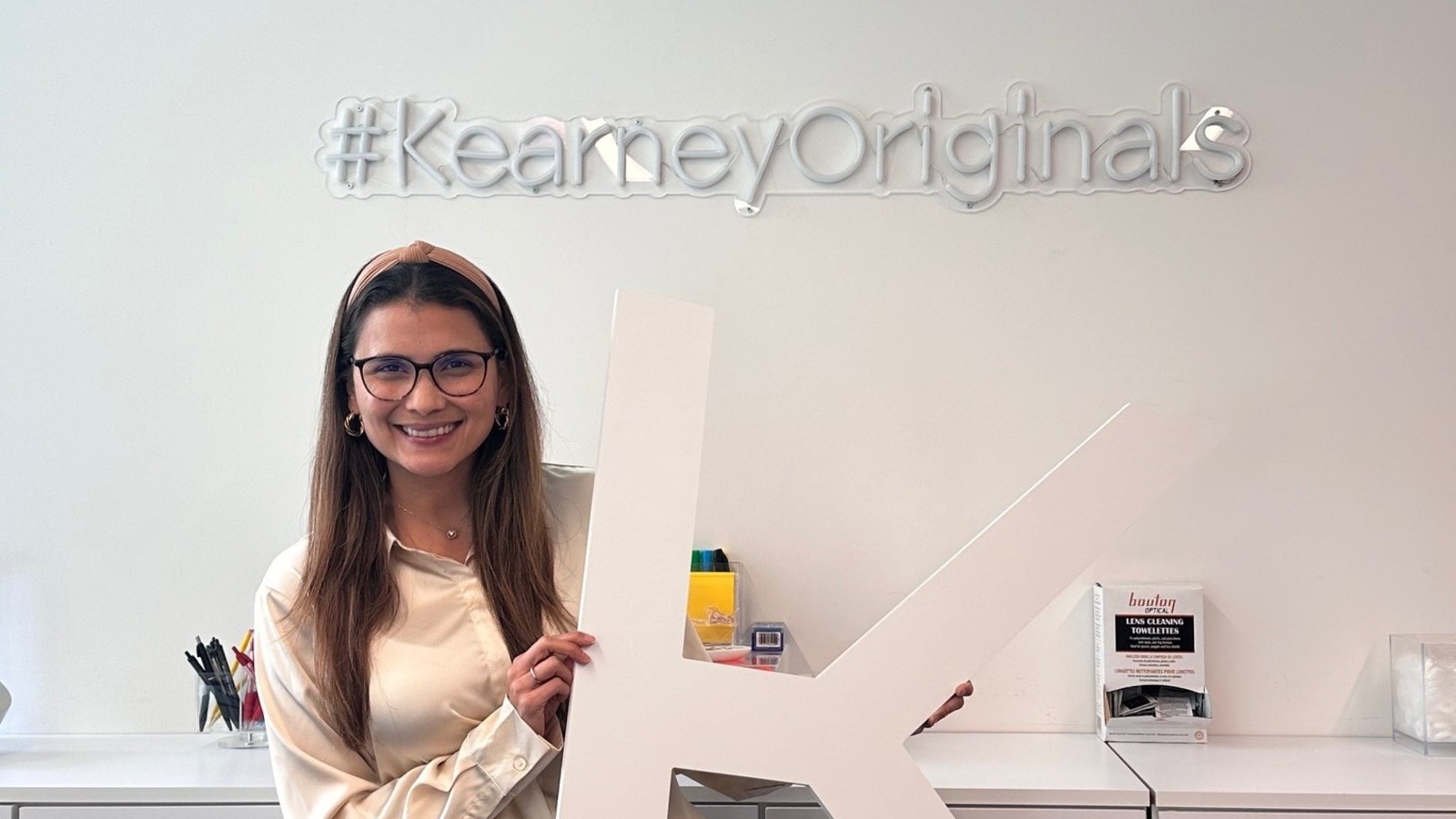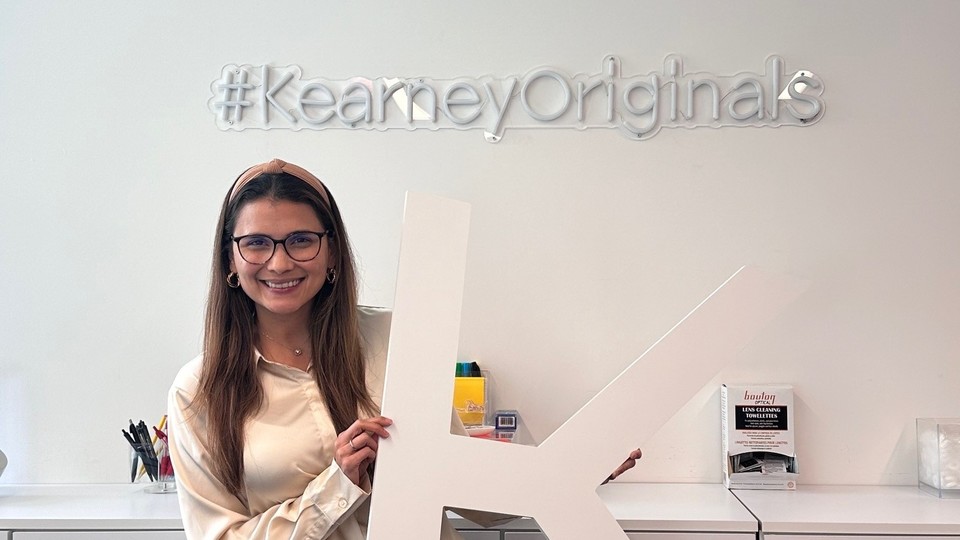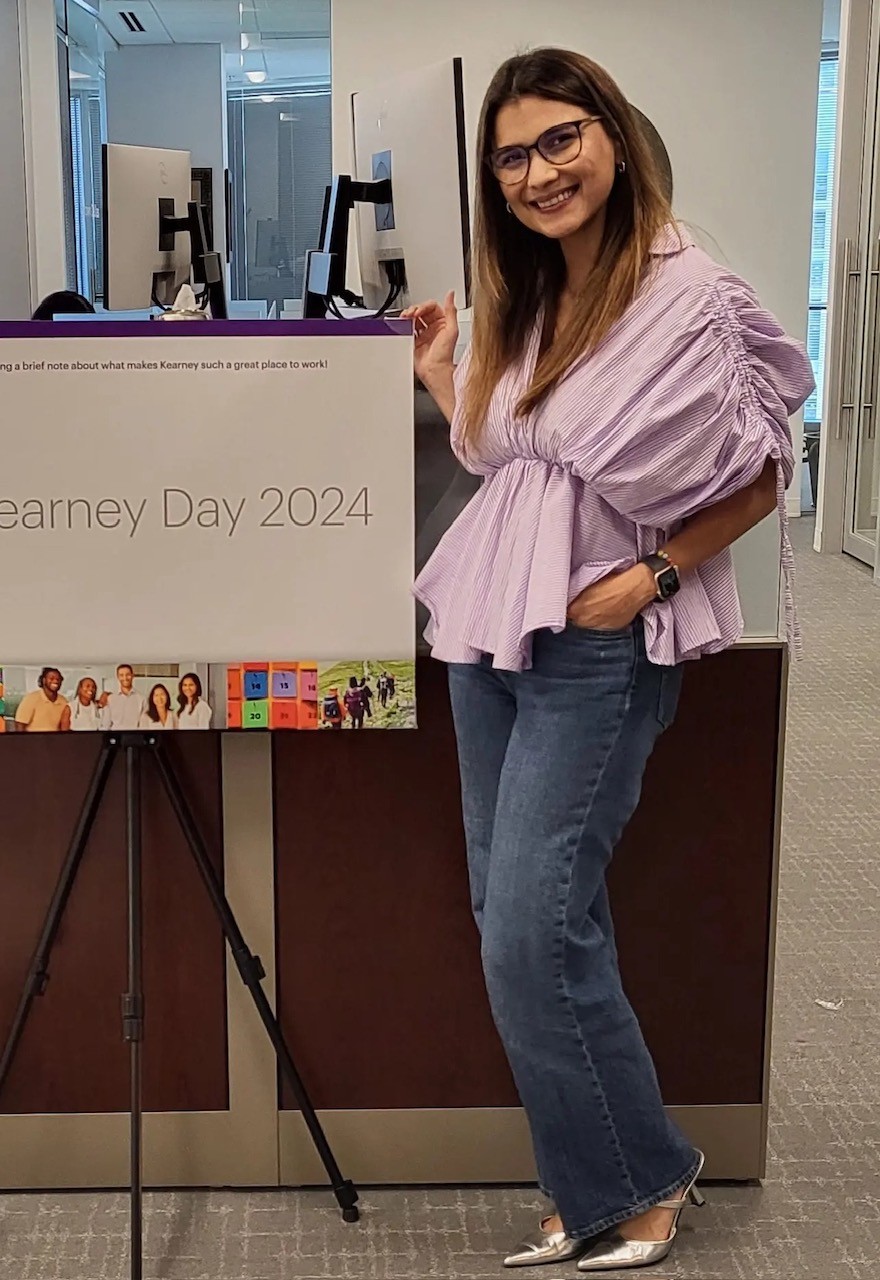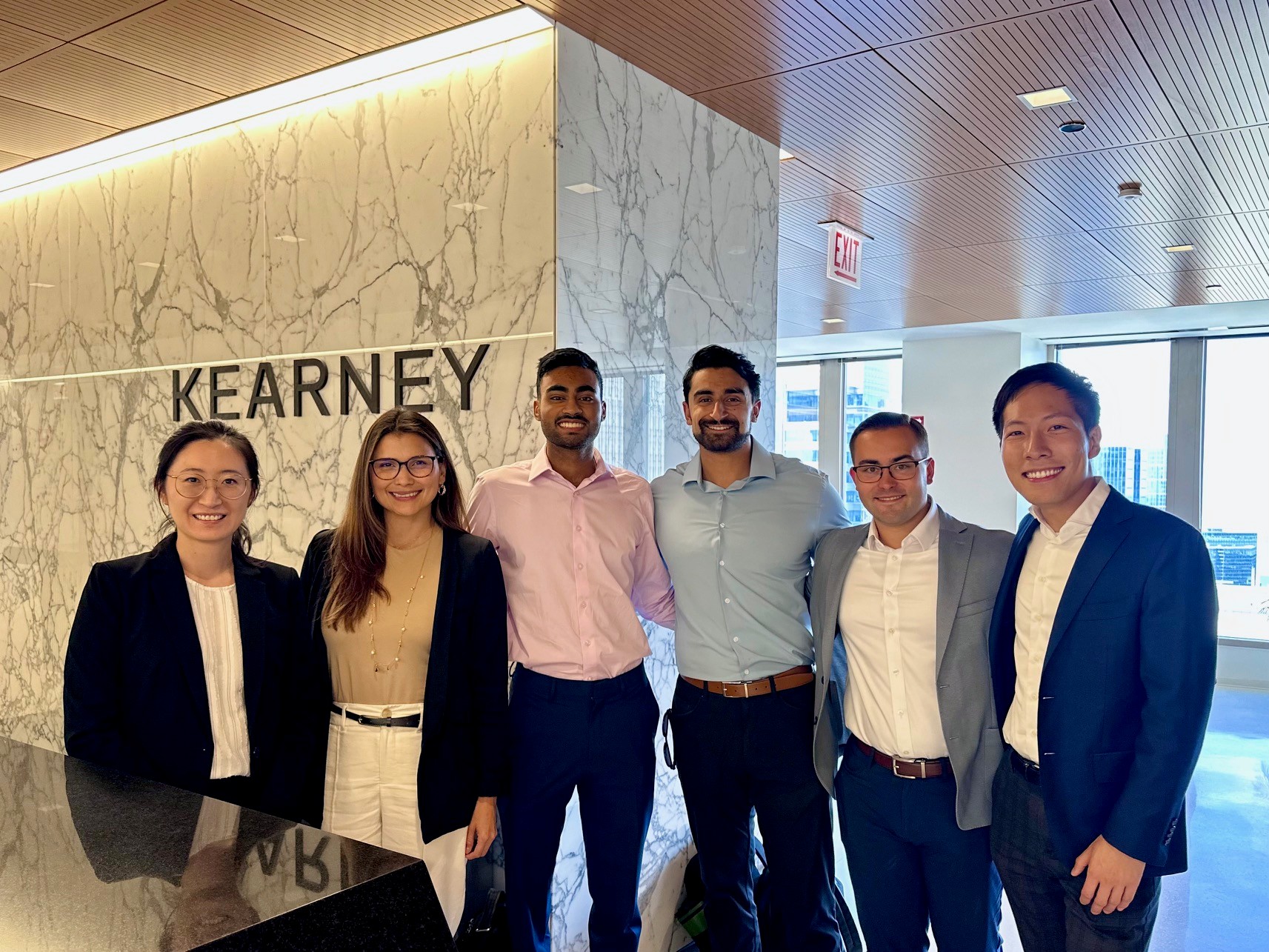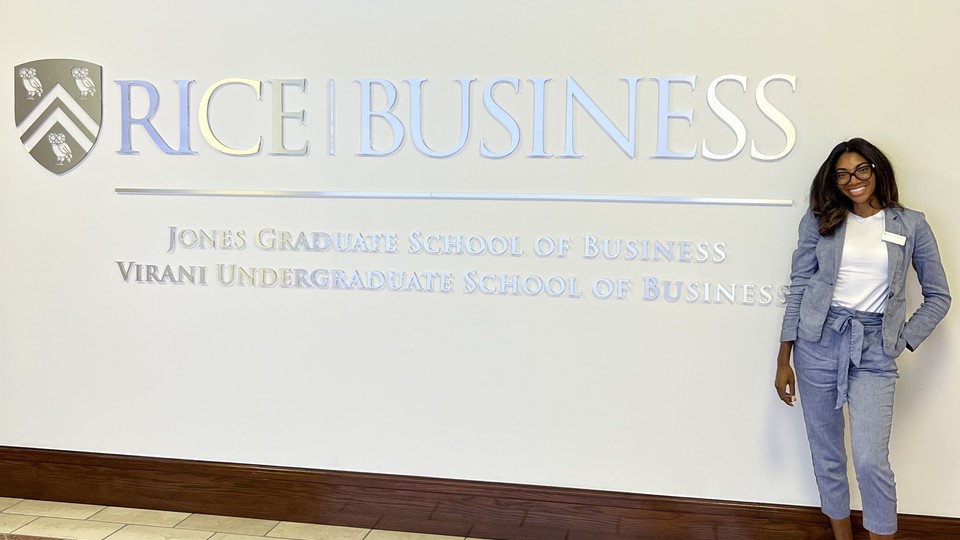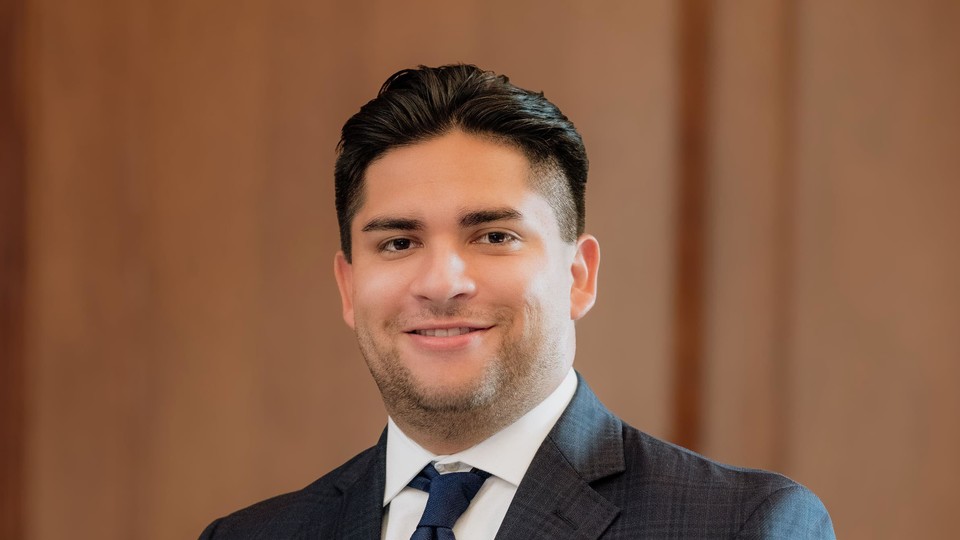A collection of things that make us fabulous — in no particular order.
We had to whittle this list down to 50 — and it goes without saying that we love our faculty, staff, students and alumni — but there are so many more things to love about Rice Business. Have a favorite you want to share? Share your memories: maureen.harmon@rice.edu
1
Used to Be Small, Now We’re Mighty
When Rice Business got its start, it was in Sewall Hall with just a few classes and a few students. Through the years, Rice Business has had homes in Sewall, Herman Brown, Herring and now McNair. In 2026, business students will gain another home — and another 112,000 square feet, as a new building opens next to McNair.
2
P-Rod
If you know Rice Business, you know P-Rod. Dean Peter Rodriguez, who goes by the nickname on his social channels and among students, isn’t always all business. His expertise in running and growing the school is well known, but so is his on-campus humor, his approachability among students and his dance moves at Partio.

3
Global Views
Don’t get us wrong, we love Rice’s campus, but we also want to see the world. The Global Field Experience allows students to tackle real-world business challenges in emerging markets like Argentina, Brazil, and Colombia. Throughout a semester-long course and during these weeklong immersions, Rice Business students get unmatched professional experience, and businesses get innovative solutions. Bonus: Students also get to enjoy the rich culture and diverse landscapes of these distant locations.
4
Vikas Mittal’s shoes
For Professor Vikas Mittal, personal expression all comes down to the sneakers. A pretty traditional dresser from the ankles up, Mittal is so well known for his creative expression through brands like ASICS, HOKA and Saucony that the students in his Executive Forum II course gifted him with three pairs of colorful kicks at the end of the spring 2024 semester. To be fair: Mittal is just one of our many beloved and whip-smart faculty members, a bunch that’s easy to add to a love list.
5
Partio
Rumor has it that the term “Partio” originated with a nervous student who fumbled the more formal name, Party on the Patio, when explaining the get-togethers to a tour group. Wherever the term comes from, everyone now knows that Partio refers to the famous Thursday evening parties featuring food, drink, friends and DJ-ed music. It’s a weekly occurrence with some very cool themes — the Dean’s Partio and Rice Around the World Partio are always crowd favorites.
6
That Family Vibe
Houston is big — the country’s fourth-largest city and its most diverse. The city offers endless opportunities, from museums to sports to green spaces, but there’s a unique comfort in being part of a close-knit community on a campus tucked inside the hedges.
7
OwlBowl
Each year, students across Houston leave the classroom for the field to compete in the OwlBowl, which brings together students from MBA programs throughout the area for a little friendly competition. Hosted by the Rice Business Student Association for Professionals, this annual charity flag football game asks that teams raise $500 each, with all the proceeds supporting local charities.
8
Campus strolls
The Rice University Outer Loop offers a shady, safe trail encircling campus, perfect for joggers and walkers alike. This dog-friendly path is lined with a beautiful canopy of oak trees and provides great views of Rice’s Mediterranean Revival architecture.

9
Cold Beer at Valhalla
At Rice, Valhalla isn’t just a mythical hall for fallen Norse heroes — it’s the go-to spot for graduate students seeking the best cold beer in Houston. For over 40 years, the valiant folks of Valhalla have served Rice’s graduate community with rotating taps of local Texas ale — and plenty of students have had their tie cut when entering Valhalla, a tradition that started with Ph.D. students who lost half their ties after successfully defending their dissertations.
10
Access to Information
Nestled on the second floor of McNair Hall, the Business Information Center (lovingly known as the BIC) is more than an oasis for students looking for a quiet place to cram. Named after Gilbert and Ruth Whitaker, this space is a treasure trove of online resources, journals and comfy study nooks. Whether you’re an MBA student diving into market research or an undergraduate trying to escape your roommates’ impromptu karaoke, the BIC’s got your back.
11
New Ideas
When the Rice Business Plan Competition, hosted by Rice Alliance, began in 2001, nine teams competed for $10,000 in prize money. Now, 24 years later, 42 international teams vie for over $1 million in cash and prizes each year, making it the largest and richest business plan competition in the world. We’re also home to the Veterans Business Battle and the Napier Rice Launch Challenge — both of which help launch innovative businesses and products that tackle some of the world’s most pressing issues.
12
Speaking of Those New Ideas
Our entrepreneurs might get their start in a pitch competition or in our top-ranked entrepreneurship courses, but their businesses span everything from design and culinary ventures to energy transition solutions. Our entrepreneurs aren’t always in it for the money, either. Plenty of nonprofit organizations — from the arts to humanitarian aid — were founded by Rice Business graduates.

13
Rice and NASA
Rice’s involvement in the space race began almost immediately, partnering with NASA in 1959. This relationship has flourished over the years, marked by key moments like President Kennedy’s iconic speech at Rice Stadium. Our connection is both historic and personal; Rice has produced 16 NASA astronauts and hosts the NASA Ambassador of Exploration Award (posthumously awarded to President Kennedy).
14
McNair Public Art
McNair is a destination for any Rice MBA — not only for its innovative classes and stunning architecture, but also for its stellar collection of public art. Since 2008, Rice Public Art has placed artworks across campus that reflect Rice’s global outlook. McNair Hall, for example, features inspiring works by 17 diverse artists who represent various cultures, ages and gender identities.
15
The Energy Connection
Located in the heart of the world’s energy capital, Rice Business provides students with access to industry leaders, cutting-edge technology and top-tier faculty expertise, equipping them with the skills needed to lead the future of energy.
16
Join the Club
Vino, veterans or venture capital — whatever your interest or group, Rice clubs have students covered. Graduate students can choose from more than 30 clubs, and our undergraduates can choose from more than 300, some of which offer opportunities to develop leadership and networking skills.
17
Our Open Door Policy
The proud doors of McNair Hall stand open (always, except in inclement weather), welcoming visitors, students and faculty alike. Flanked by the iconic bear and bull statues, these ornate doors tell the story of the graduate school’s namesake, Jesse H. Jones, through intricate bronze carvings.
18
Our Undergrads
After welcoming graduate students for 50 years, Rice Business recognized the community’s need and desire for an undergraduate business major and launched one in 2021. This past May, we celebrated our first class of undergrads (new grads: welcome to the alumni ranks!), and the young major is already the second-most popular major at Rice.
19
Our Graduate Students
From MBAs to PhDs, our graduate students embody excellence. We’re proud of our Master of Accounting students — the school’s trailblazing program that returned to campus after a 20-year hiatus — and are thrilled to see our PhDs extending Rice’s impact as they secure positions at prestigious universities worldwide.
20
Turrell Skyspace
“The Twilight Epiphany” Skyspace, located in the middle of campus, offers stunning light shows at dusk and dawn, as well as musical performances in the remarkable acoustic space. The light-and-space masterpiece by James Turrell has been a go-to spot since 2012.
21
Metal and Muscle
Professor Brian Akins is well-known for his finance expertise, but students also recall his love for heavy metal and weightlifting. After transitioning to teaching a second-year elective, Akins ditched the formal attire and started sporting Slayer and Meshuggah T-shirts in class. One highlight? Maxing out deadlifts with former student (and now alum) Jimmy Vu ’16.
22
The Wisdom
Rice Business Wisdom has been bringing the latest business thinking to life since 2016. Delivering engaging, smart and authentic insights from the best business faculty research, RBW blends scholarly rigor with actionable insights, making complex ideas understandable and impactful.
23
Rice Sports
Rice students might compete against one another in flag football or intramurals, but everyone unites when the Owls hit the field. Our students love to show their school pride during any sporting event, but the energy is its highest when playing against our neighboring rivals: the UH Cougars. And with professional teams in almost every major sport, Houston is a competition hot spot.
24
“Firewater” Tradition
From 2007 to 2019, Professor Haiyang Li led Rice MBA students on annual trips to China, where they were introduced to Baijiu, the country’s beloved “white liquor.” Baijiu became a memorable part of these trips. Professor Li even brought a bottle back to campus for a celebration event.
25
Launch
Launch is more than just an orientation — it marks the start of the Rice Business journey, no matter which program you choose. Students meet classmates, attend core classes and connect with the faculty who will guide them through the program.
26
Student-Organized Conferences
Rice Business students don’t just attend conferences — they lead them. Between the Women in Leadership Conference (WILC), Rice Energy Finance Summit (REFS) and the Rice Cleantech Innovation Competition, our student-organized events draw hundreds of attendees each year.
27
Anderson Family Commons (AFC)
We truly embrace the “family” aspect of the AFC, an event space on the first floor of McNair. Named in honor of the Anderson Family, the AFC is the perfect gathering spot for weekly lunch colloquiums for full-time students, evening family meals for EMBAs, and events like Reunion, guest speakers and our annual staff awards ceremony.
28
Gibbs Convocation Hall
It’s not quite Hogwarts, but the Gibbs Convocation Hall has the charm of an esteemed, prestigious library that rivals those in movie sets. Nestled on the second floor of McNair, Gibbs offers a quiet space for students and faculty to study or engage in conversation, accompanied by the soft strains of music.
29
Rice Alliance
The Rice Alliance for Technology and Entrepreneurship, now housed at the Ion, is more than a launchpad for startups — it’s the heartbeat of Houston’s innovation ecosystem. Established to fuel the growth of tech companies and commercialize groundbreaking ideas, Rice Alliance, which hosts the Rice Business Plan Competition, has gained national recognition in the world of entrepreneurship.
30
Getting Fancy
We all love a lavish event. Each program has its own end-of-year event hosted by the Full-Time Rice Business Student Association and the Professional Rice Business Student Association. The MBAs, for example, enjoy a spring gala, an annual formal gathering held at incredible venues in Houston each spring. From a Bridgerton Masquerade in the Ballroom of Bayou Place to a Night at the Museum of Natural Science, the event is a highlight of the Rice Business experience.
31
The Experience
You might have known it as the Student Programming Office. These days we call it the Office of Academic Programs and Student Experiences (APSE). While the name has changed, the mission remains: help every student reach their potential. APSE provides numerous educational opportunities, pushing our MBAs to new heights through international initiatives, dynamic cocurricular activities and student advising.

32
Audrey's
What word beginning with “c” do you think is mentioned most often at Rice Business? Capital? Consumer? Corporate? The answer is CAFFEINE. Named in honor of Audrey Moody Ley ’35, Audrey’s café has stood as a beacon for students or faculty in need of a midday pickup. The coffee hot spot is currently closed while we undergo construction, but not to worry: Audrey’s will reopen with the new building in 2026.
33
On-Campus Learning
Who says online learning can’t be hands-on? Our Intensive Learning Experiences (ILEs) bring the Hybrid MBA and MBA@Rice communities to campus for weekends of high-impact learning. While earning core credits, our students forge lasting connections with peers, faculty and industry leaders. It’s the perfect blend of flexibility and face-to-face collaboration. But they’re not only for our online learners: we also host ILEs for our full-time, executive, and professional students.
34
Stephen Zeff
“Dedication” might be just one word to most, but at Rice it’s two: Stephen Zeff. With a career spanning decades, Professor Zeff exemplifies what it means to be an educator. He has taught at dozens of institutions across the globe, authored or edited 32 books, published over 150 articles in accounting, and received countless awards.

35
Follies
Look, we’re a very serious institution of higher education. But we still know how to have fun, and we don’t take ourselves too seriously. Every year, Full-Time MBA students come together for the Follies, a light-hearted celebration of their MBA journey. It’s a chance to playfully tease faculty members and poke fun at our communications team for their frequent social media requests, capturing the authentic Rice Business experience and giving everyone a good laugh.
36
Healthy Living
While our students’ professional growth is important to us, their personal well-being is always our top priority. The Barbara and David Gibbs Recreation and Wellness Center — with its two pools (one for just chilling in the Houston heat), 11 fitness and wellness programs, over 30 annual outdoor trips and 9,000-square-foot gym — offers opportunities for rest and rejuvenation just a short walk from the classroom.
37
Owl Have You Know
Business isn’t a linear path; it’s full of ups and downs, trials and triumphs, setbacks and comebacks, all leading toward success. Rice recognizes the value of these stories and the inspiration they offer. “Owl Have You Know” is our award-winning podcast where alumni, faculty, students and other community members share their remarkable journeys.
38
The ROI
While we cherish our time with students, we know it isn’t forever. Our Career Development Office (CDO) partners with students and alumni, working to ensure they launch their own meaningful careers and connections. Rice is proud that our MBAs accept job offers at companies like Chevron, Barclays, Morgan Stanley, Deloitte and the MD Anderson Cancer Center, and our Ph.D.s are placed at top research universities across the country.

39
Owlympics
Whether you’re competing in events like a bubble soccer tournament and a crawfish boil or cheering from the sidelines, the Owlympics are the perfect excuse to battle it out with faculty and students. The best part: the creative, coordinated team uniforms.
40
Like your degree? How about two?
In 1999, the business school partnered with Baylor College of Medicine to offer a dual MD/MBA degree to develop administrative leaders to tackle critical issues in health care like rising costs, access, affordability and organizational inefficiencies.
41
Flexibility
The world of business is evolving, and we’re keeping up with the trends — including the growing overlap between work and life. That’s why Rice Business created flexible programs to support students as they balance careers, families, school and passions. Both the Hybrid MBA, which blends remote and in-person learning, and the Online MBA, recently ranked a Top 5 program by The Princeton Review, give students the flexibility they need.

42
Rice Business Magazine
Allow us to toot our own horn for a moment: Rice Business magazine (called The Jones Journal prior to its big makeover in 2016) is your biannual link to our community, offering a lively mix of student news, alumni stories, entrepreneurial advice and the latest insights from our faculty’s research.
43
Liu Idea Lab (Lilie)
The Liu Idea Lab for Innovation and Entrepreneurship, created in 2015 with a generous gift from Houston entrepreneur and alumnus Frank Liu and his family, is more than just a lab — it’s Rice’s hub for experiential learning and innovation. Through hands-on programs and real-world challenges, students from all disciplines develop the entrepreneurial mindset needed to launch tech startups and drive innovation in global firms.
44
Shell Auditorium
When you need a stage to share big ideas, Shell Auditorium in McNair is the place to be. The state-of-the-art venue, complete with tiered, theater-style seating for over 400 guests, is the perfect space for conferences, “last lectures” and business plan competitions.
45
Pretty Pics
Arching oaks and striking columns are just a few of the elements that make Rice’s campus one of Houston’s most beautiful spots, with plenty of Insta-worthy areas to capture photos. Case in point: the famed RICE sculpture outside Lovett Hall, allowing students and visitors to take their place as the “I” in Rice — once again proving that you belong here. The iconic quad also recently reopened after the treasured four-acre space was reimagined from a walk-through area to one that is designed for activities, encouraging connection, reflection and personal growth.
46
Alumni and Reunions
Our alumni are not only well connected; they’re also a lot of fun. Annual reunions are a great chance for faculty and staff to catch up with alumni who bring energy, creativity and a spirit of camaraderie wherever they go. Can’t make it to Houston? Rice Business has regional chapters for our alumni that host social events, lectures from visiting faculty members and plenty of shared stories.
47
Schooling for Executives
Our Executive Education program is Rice’s home for executive and organizational leadership solutions with an array of programs suited to the C-suite. In 2023, more than 1,000 leaders, including 420 women, from more than 240 firms took advantage of our programs to better their business and leadership skills.
48
Road Trips
Imagine stepping out of the classroom and into a Fortune 500 company headquarters, meeting Austin’s tech giants, or experiencing Wall Street or Seattle firsthand. Welcome to Career Treks — a unique opportunity for all Rice MBA students to explore company culture, gain industry insights and connect with companies and the powerful Rice Business alumni network.
49
Barb's Funky Houston Tour
In 2021, Barbara Bennett, then the senior associate dean for degree programs, floated the idea of creating a Houston tour for incoming Full-Time MBA international students. The tour focused on showcasing the local and funky sides of the city — its hidden treasures — and included The Beer Can House, The Orange Show Center for Visionary Art, Smither Park, The Moody Center for the Arts and the Turrell Skyspace. Bennett acted as tour guide between stops, highlighting spots like the American Statesmanship Park, the murals in downtown Houston and other attractions.
50
Our Home: Houston
As one of the most cosmopolitan cities in America, Houston celebrates its multicultural roots with festivals, cultural centers and a diverse culinary scene, allowing students to explore the world without having to book a flight. Houston is home to the Texas Medical Center, the world’s largest med center; very cool areas like the Theater District, the Museum District, Hermann Park, Memorial Park and the Houston Arboretum; and events like the Art Car Parade, an annual tradition in which thousands line the streets to admire quirky contraptions driven by passionate artists. We also have the Ion District, 12 blocks full of energy and innovation, where startups, tech wonks and creative minds hang out and bounce ideas off each other. Plus, Rice’s innovation factory, the Rice Nexus, is set to be the heart of Houston’s next big chapter at the Ion. Whether visiting NASA; cheering on the Astros, Texans or Rockets; or donning a cowboy hat at the Houston Livestock Show and Rodeo, Rice students develop a deep appreciation for Houston and a habit of saying “y’all.”
